#i think going to concerts where artists play instruments has influenced them
Explore tagged Tumblr posts
Text
All jokes and horny aside(I do love horny and specific position only🙏 and them fighting over everything always ever and ooc fun scenarious) radioapple are so interesting to think about, about their dynamics, and the characters in general. So I will!
As they are in canon now, Lucifer did not care for Alastor plus the general disgust(and guilt) towards sinners. And then the song happened and Alastor became Lucifer's enemy number one xD If Alastor will drop it, Lucifer won't have a reason to hate on him, but initial negative imperssion is still there.
And Alastor, he is a mysterious guy. The abusive dad is still a theory, him being momma boy and therefore connecting with women better doesn't say anything about his dad situation. The Lilith's deal is also just a theory for now. So for me his immediate negative reaction comes from the same place as his annoyance at Carmilla disregarding him. He wants to be on the top, the most unknown, the most powerful one, the most scary one. He loves attention, he loves keeping everyone alert with his antics.
And he loves being in control, his plans going exactly the way he wants them, not that he can't improvise. He immediately tenses when he sees the sign welcoming dad, he knows. The King of Hell has the ultimate power, the ultimate influence, the ultimate importance. Alastor does not mind someone being more than him in something like he is politely neutral with Zestial. But the hotel carries importance for Alastor's plans so he feels threatened. Before with Charlie's daddy issues I guess he did not expect to see him anytime soon. But here he is, threatening to pull Charlie from his influence, from her needing his powers.
But then we see him being completely chill and not antagonistic at all. One of the reasons I think is that he let his stim out, for a reason being restricted in his activities, the deals he can make, the souls he can take, the kills. And because Charlie needed Lucifer to arrange a meeting with Heaven, something that only Lucifer can do. And that's it. So he lets go for a bit.
Who knows what dynamic season 2 will bring, now that Lucifer stays at the hotel and Alastor took a hard blow at his ego and reputation.
In the wiki it is stated Alastor dislikes people who are like him, but likes people who are more like him, but who knows where is this line. He also said to like Willy Wonka character for being an entertainer and a dick. And Lucifer was told to be like that character. For now Lucifer is a depressed sad baby, but we saw how he can be when he is fucking with others. Alastor likes fun, no matter how this fun is done. Potentially he can enjoy Lucifer's presence. Not to mention, he respects power, at least when the whatever deal with Alastor is done, potentially.
Don't know how prevalent this is now, but both seem to enjoy collecting certain things, like ducks and those firby toys. Both were drawn to dance-vibe with each other.
Speaking of, both love music and play instruments, they can totally jam with each other, making their own little concerts.
Lucifer's idea of sinners will be definetely challenged with Alastor. It's one thing to meet a nice sinner and think 'ah they are not like everyone else'. But it's a completely different thing when this sinner is exactly what you hate about them, the maniac who loves violence. And then you have to come to terms that even THEY can become better, can have something to them. Lucifer drowned himself in guilt and shame, it would be nice to get a bit in touch with people in Hell. Because it seems like he stays away from most things sinners bring with themselves.
Alastor was told to like theatres, so it would be nice for them to go together, to try and see something good from humanity even in Hell. Something that can still keep not being corrupted. And humans creativity and artistism can definetely spark more hope back to Lucifer.
And I think Lucifer would appreciate someone who treats him as equal, it doesn't look like he cares much about being a King, so having someone who will not shy away at punching first can be good.
Lucifer's main support of course would be Charlie(and hopefully hotel crew), but having someone who he can rely to get things actually done is pleasant. He is a King of Hell but he doesn't often act like one, he surely will benefit from someone who can act appropriately spooky. (He can get scary, but I think he needs to get MAD mad for this side of him to appear and at that point you better have Charlie around to calm him down)
And they have to keep the beef part of their interactions, it's just fun to have someone you can freely argue with with no hard feelings afterwards, just a battle of words, their interests don't always aligning. And it's fun to mindlessly banter about them. Like their sweet and bitter food preference, or cooking techniques, etc. Small irrelevant things, or maybe even some clash of ideals, but it is oh so fun to let yourself go lose and not hold back.
It would be nice for them to develop mutual respect and learn to care about each other's boundaries, be it the painful personal history, or choices of leading the relationship.
Yes, the aroace situation. Start with simple, I do not believe Lucifer is straight(nor NT xD) and he is perfectly sex-positive(he started with no experience and no shame either xD). He is more on a demi spectrum for me, getting excitedly horny only with close people(one-times can happen, it's a grey(literally) area). And Alastor... he is touch-aversed until you are close, then the touching is required(both gentle and playful and rough, depending if he wants to sooth himself or get energised or let the stim out). The same with the bed situation. He gets attracted long after all the other bonds are formed. He is sex-indifferent, never wanted with anyone so never went there. He is perfectly content with himself. And when it starts, yet again, depending on what it feels like in the moment.(cannibalism was not the only thing he grew to like in Hell(¬‿¬))
182 notes
·
View notes
Text
INTERVIEW: Sarah Goldstone On Touring With Boygenius, Books, and Boston Octobers
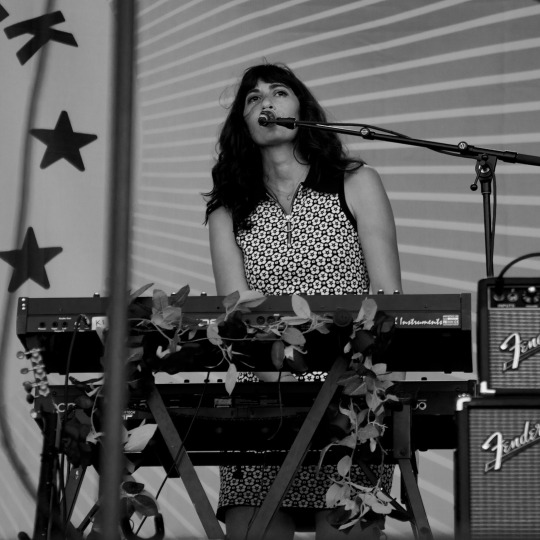
by Maya Santow
[…] Since her graduation from Boston University in 2009, Goldstone really has gone everywhere. Her talents on the keyboard, violin, and vocals have taken her across the globe in the past two years, touring internationally with indie artist Lucy Dacus, and now Boygenius—the indie rock supergroup composed of Dacus, Julien Baker, and Phoebe Bridgers.
Sitting in an East Boston café on June 18, just hours before performing with Boygenius at the Stage at Suffolk Downs, Goldstone describes how it felt finding out that she would be joining Boygenius on their tour while she was in Dacus’ band.
“Oh, I was really pumped,” she says. “Lucy had said that she wanted to have me there. Her manager called me and we chatted about it. It was exciting. I just love them as a group and separately.
“Boygenius: The Tour” began its United States run in early June and will be extending overseas to Europe in mid-August. Several of the tour dates, including the Boston show, are a part of the Re:SET Concert Series, featuring supporting acts like Bartees Strange, Dijon, and Clairo, with Boygenius as a headliner.
Although the tour didn’t begin until the summer of 2023, Boygenius’ first full-length studio album, titled “The Record,” was in the works much earlier. Goldstone recalls being told about the album at least a year before its March 2023 release—a powerful secret to have been keeping, given the album’s critical acclaim. “There was definitely a, you know, ‘Don’t put this on the internet’ kind of thing,” she says.
Goldstone’s first time hearing “The Record” took place at a listening party with Dacus’ touring crew in a Northern California AirBnB. With the knowledge that she would be touring with Boygenius, Goldstone approached her first listen to “The Record” from a largely practical angle.
“When you take a record that was recorded with all these different instruments, and you’re trying to squash it down to, ‘Okay, what’s a setup where I can do all of that?,’ there’s a lot of different ways you can do it,” she says. “So when I was listening through, that’s where my brain was going.”
Goldstone’s primary focus while listening was the keyboard. There is more to the instrument than meets the typical listener’s ear, she explains. “I feel like a lot of times people don’t know what keyboard’s role does because people know what piano sounds like, but maybe not the other stuff,” she says. “But there’s a lot of synth parts, there’s organ, there’s something called a Mellotron…all those weird sounds where people that come to hear it are like, ‘I don’t know what that is.’”
“My first reaction was really technical, but then I started listening for real and, you know, some of the songs make me cry as soon as I hear them,” says Goldstone of the 12 tracks that make up “The Record.” “Some of them are so funny, and, like, mean, and you know, that’s fun, too. But it took a minute for me to experience it that way,” she says.
As Goldstone began touring with Boygenius, a few tracks emerged as her favorites to perform live. “I love ‘Not Strong Enough.’ I mean, that’s like, ‘the one,’ right?” she says. “I love ‘Letter To An Old Poet’— not just because it’s the piano song! Actually, ‘Cool About It’ is one of my favorite songs, too. Plus the rockers, like ‘Satanist,’ and stuff like that, it’s just, like, so fun. But every song is good, yeah—no duds,” she laughs.
Goldstone also cites a fan project for Boygenius’ “True Blue”—a track heavily influenced by Dacus’ solo music style—as a favorite memory from the tour so far. “I think they all put blue post-it notes over their phone lights…as soon as they started playing it, blue lights came up,” she says. As it turned out, a similar fan project took place at the Boston show later that night: during the chorus of ‘True Blue,’ the audience raised heart-shaped cutouts of blue paper over their phone flashlights to create a sea of blue for the band to see. “It sounds funny to say, but it made all of us kind of emotional, actually,” she says of the earlier project.
Goldstone notes the synergetic power of Boygenius fans—the fan bases of the three indie rock forces coming together creates something greater than the sum of their parts, she says.
“People are there for the unit,” says Goldstone. “Probably everybody has one of them that they gravitate toward more just in their own personal listening, or someone’s music they’re familiar with more than the others, but you can’t tell that from the show, which I think is really cool. It doesn’t feel like you’re seeing individual fans of the three of them.”
Goldstone cites Boygenius’ closeness to one another as a major draw for their fans, aside from their music. “I feel like people are fans of their friendship,” she says. “Like, we all want that. We all want best friends that we like to make art with.”
Having been on tour together for a few weeks, says Goldstone, the band’s dynamic has begun to shine through even more onstage. “Now that everyone’s comfortable, they’re starting to horse around a little bit, and they’re jumping around,” she says of Dacus, Baker, and Bridgers. “You know, it’s just three friends that love each other so much, and they’re all very funny people. So it’s fun when they’re in the mood to do, like, comedy time during shows, you know?”
Closeness as a band—“tour camaraderie”—is a familiar feeling to Goldstone, who says that Dacus’ band grew very close during their 251 days of touring in 2021 and 2022. “Everyone’s on one bus, and everyone hangs out together on off days, and it does feel like a family road trip sometimes,” she says.
The Boygenius tour took a bit longer to achieve the same effect, says Goldstone. “It is a much bigger group. And everyone just works so hard, so there’s a little bit more distance with just getting to know everybody. I feel like now, a couple of weeks in, I’m starting to be friends with people on our own crew that maybe I didn’t get to hang with before, and that’s great,” she says.
One way in which the group has grown closer, says Goldstone, is through books. Perhaps unsurprisingly, given her philosophy major during her BU days, Goldstone says she always finds time to read while on tour, and exchanges titles with the other band members as well. “We’re all trading books,” says Goldstone.
On Dacus’ tour last year, says Goldstone, the band passed around Joan Didion’s “Play It as It Lays.” In a similar way to which fans of Boygenius bond over the often melancholy tones of their music, the band bonded over the “real bummer of a book,” says Goldstone. “We passed it around, and everyone was like, ‘Ugh, your turn.’ Like, this is brutal,” she laughs.
“So, yeah, there’s some exchange,” says Goldstone. “Lucy and I will exchange books a lot. Like, I’m really into a writer named Shirley Jackson, and Lucy read some last year.” Goldstone’s most recent tour read, Min Jin Lee’s “Pachinko,” she describes as an “instant classic,” and she plans to lend it to Julien Baker to read next.
(x)
5 notes
·
View notes
Note
What's Ralph's music taste now like? To which concerts has he been?
oh, you know he's still a major swiftie, the day they announce when the uk eras tour goes on sale, ralph's booking annual leave: the day before they go on sale to prepare, the day of to wait and the day after to appropriately react depending on whether or not he got them
but that's mostly to share the experience with anna (cc @keerysquinn) and to take part in the theatrics of making an eras outfit of his own and maaaaybe also to tie in with another deleted-scene idea where the swiftie community tries to claim ralph as their own (i'll reblog that other ask with more on that). i think in general his music taste is relatively generic. he still loves to dance, but more to generic pop music, as long as it's not too heavy on the electronic instruments. i like to think he discovers harry styles' music all by himself, enjoys it, but is then horrified to learn that he's also one of tswift's exes lol
he likes more muted songs, too, ones that he can learn to play on his uke (and i think connor would eventually teach him to play guitar, too)
okay i typed this whole thing out about how i think concerts would overwhelm him so he would only attend them if the artist meant a lot to his friends, he'd go with them, but i now have the thought of influencer!ralph stuck in my head so he'd totally abuse his pr privileges to get himself and his friends their own box or backstage access, but he'd only do that for artists they really enjoyed, not so much for his own enjoyment. he's happy enough just listening to music on the amazon echo that he refuses to help you revert the voice preference settings on lmao
it's a busy streets and busy lives-themed sleepover night! :)
#bsbl night#ralph timewasters#ralph penbury#ralph timewasters x reader#ralph penbury x reader#ralph timewasters x you#ralph penbury x you#ralph timewasters imagine#ralph penbury imagine#bsbl
8 notes
·
View notes
Text
Legendary composer, Philip Glass, takes refreshed view on beloved work, SOLO, out now!
Philip Glass, one of America’s most esteemed composers, releases a new album, Philip Glass Solo, via Orange Mountain Music. The collection is an intimate portrait of the renowned pianist at 84, as he takes a new look at some of his most enduring and beloved piano works. It is available in both digital and limited-edition condensed vinyl formats—Listen/order HERE. Watch/share Glass performing at home HERE.

Philip Glass Solo was recorded at a time when the world was undergoing a major shift—for Glass, that shift manifested in going from a busy tour and premiere schedule to time spent at home during the COVID-19 pandemic. The storied musician dedicated this time to revisiting some of his most critically acclaimed piano music, taking to them with a new view in his home studio in New York. It is his most personal record to date, offering a snapshot of his life, and a portrait of daily practice over eight decades through several cherished works.
Now 86, Glass reflects, “This record revisits my works for piano. From 2020-2021, I had time at home to practice the works I have played for many years. This record is both a time capsule of 2021, and a reflection on decades of composition and practice. In other words, a document on my current thinking about the music. There is also the question of place. This is my piano, the instrument on which most of the music was written. It’s also the same room where I have worked for decades in the middle of the energy which New York City itself has brought to me. The listener may hear the quiet hum of New York in the background or feel the influence of time and memory that this space affords. To the degree possible, I made this record to invite the listener in.”
Philip Glass Solo features “Opening,” originally written for the 1982 album Glassworks, which remains one of Glass’ most transfixing pieces and established a sound that quickly became a calling card, “Metamorphosis” I, II, III, and V, the series of music Glass arranged for his first solo piano concerts in the 1980s; one of his most beloved pieces and longest performances on record (at 16:35), “Mad Rush,” which he composed as an organ piece in 1978 when the Dalai Lama made his first public address in New York; and a reworked version of “Truman Sleeps” from the soundtrack of the beloved 90s film The Truman Show, where Glass appeared on screen performing the piano in one of the pivotal scenes of the film. His changes speak to the heart of all artists’ evolution of both themselves, and their music, over time.
Born in Baltimore, Maryland, Philip Glass is a graduate of the University of Chicago and the Juilliard School. In the early 1960s, Glass spent two years of intensive study in Paris with Nadia Boulanger and, while there, earned money by transcribing Ravi Shankar’s Indian music into Western notation. By 1974, Glass had a number of innovative projects creating a large collection of new music for The Philip Glass Ensemble and for the Mabou Mines Theater Company. This period culminated in Music in Twelve Parts and the landmark opera Einstein on the Beach, for which he collaborated with Robert Wilson. Since Einstein, Glass has expanded his repertoire to include music for opera, dance, theater, chamber ensemble, orchestra and film. His scores have received Academy Award nominations (Kundun, The Hours, Notes on a Scandal) and a Golden Globe (The Truman Show). Glass’s memoir Words Without Music was published by Liveright Books in 2015. Glass received the Praemium Imperiale in 2012, the U.S. National Medal of the Arts from President Barack Obama in 2016, and 41st Kennedy Center Honors in 2018. Glass’s recent works include a circus opera Circus Days and Nights, Symphony No. 13, Symphony No 14, and Triumph of the Octagon, commissioned and premiered by the Chicago Symphony Orchestra. Glass is currently writing his 15th symphony commissioned by the National Symphony Orchestra.
PHILIP GLASS—PHILIP GLASS SOLO DIGITAL & CD
1. Opening | 5:57
2. Mad Rush | 16:35
3. Metamorphosis I | 7:26
4. Metamorphosis II | 7:31
5. Metamorphosis III | 6:17
6. Metamorphosis V | 5:29
7. Truman Sleeps | 4:39
PHILIP GLASS—PHILIP GLASS SOLO VINYL
Side A: 1. Opening | 4:01
2. Metamorphosis I | 7:26
3. Metamorphosis II | 7:31
Side B:
4. Mad Rush | 8:08
5. Metamorphosis III | 6:17 6. Truman Sleeps | 4:39
1 note
·
View note
Text
Run BTS show content ideas that we might see in the future.
...and not necessarily as a Run BTS episode!
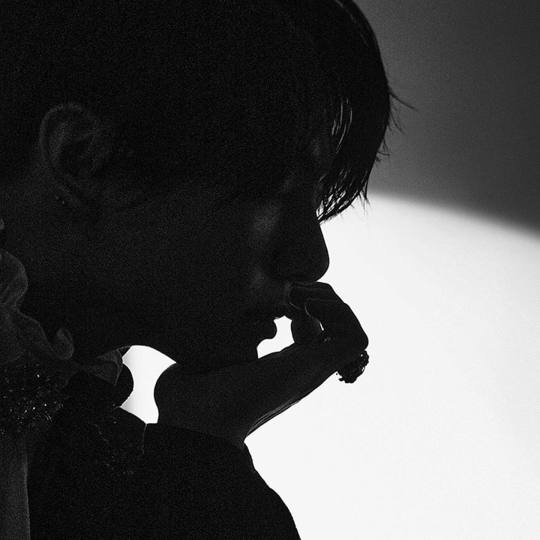
This Photo Folio idea was Jungkook’s because during Run BTS ep. 124 aired Jan. 12, 2021, he came up with this idea. Here is how that episode unfolded and all the ideas that poured forth and a long analysis of how many have been used so far:
In the first part of episode 124, they brainstormed and presented ideas. They were given about 20 minutes to jot down some ideas. They did a lot of talking while sitting. Hobi said roller skating. JK and RM approved, then Hobi backtracked thinking it too dangerous, then Jin said in that case bicycles are too dangerous too. Yoongi said tennis and RM approved of that too. A few months after they filmed this, they probably shot the Dynamite MV’s and all that went with Dynamite including the roller skating rink that ended up in a couple of Bangtan Bombs. As we saw, Tae and Hobi were newbies at roller skating.

They all jokingly talked about a drivers license challenge for RM.
Hobi said hair designer. Yoongi brought up team sports and JK said e-sports, Yoongi said basketball.
Hobi said raw fish/slicing fish which was a very unique idea. A sushi show. We’ve seen various Run BTS episodes that involved cooking and food prep.
Jimin said keyword location hunt meet up using memory or telepathy to find it and all meet there. Yoongi said it could be emotional, Hobi said it would be funny if all but one made it to the meeting spot...they all laughed about the possible outcomes of that idea.
After writing down their ideas they each stood on the platform and made presentations.
They all said standing up there speaking made them nervous. (kekekeke)
Yoongi's presentation:
Sports challenge but wasn’t clear whether to play as one team against another unknown team or what. They did table tennis in episodes 138 and 139.
Psychological counseling or mental analysis which Jimin thought it was a great idea. This was the MBTI Lab videos they posted on BangtanTV back in May of this year.
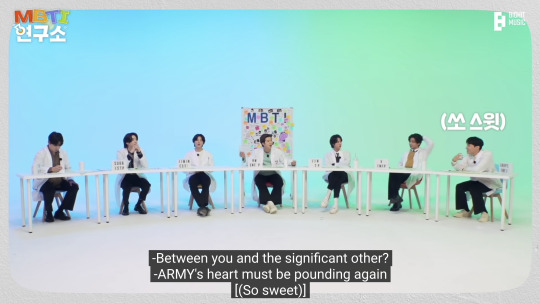
Tae’s presentation:
Learn a music instrument and then perform a song as a band. Um is this why JK has been really taking his drum lessons seriously? We’ve seen him carrying the drum stick case everywhere and not yet once seen him playing drums recently.

Bangtan in disguise...travel on public transportation etc. and if you arrive at the final point without being recognized, you win. As soon as you are recognized, you are out of the game. Everyone agreed that was a brilliant idea. But good luck with that. Security guys will need to be in disguise as well.
Hobi’s presentation:
Hair designer. Jimin was ok with it as long as it was just styling and not cutting. I am really, really serious now. All of the long hair on the members is for this episode. We will be getting Hair Designer Bangtan in an Run BTS episode. Mark my words.
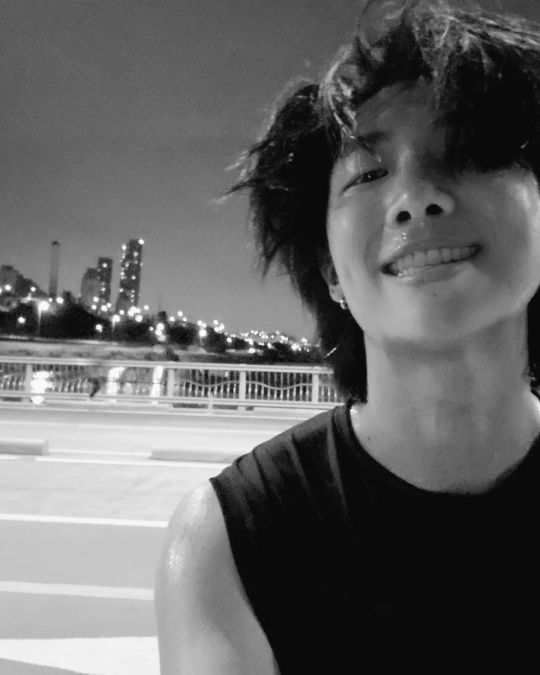
Healing time doing what each member likes to do for self care but separately. Jimin did not like it because he feels they should be together doing something.
BTS song festival, divide into teams and make songs to upload to Soundcloud for Army.
Jimin’s presentation:
The telepathy meet-up. This is obviously the theme of the upcoming Run BTS reboot – the Run BTS Telepathy Special teaser with them being led out of the studio blindfolded and we’ve seen photos of them out on the streets and in front of that stadium. All of which was filmed earlier this year.


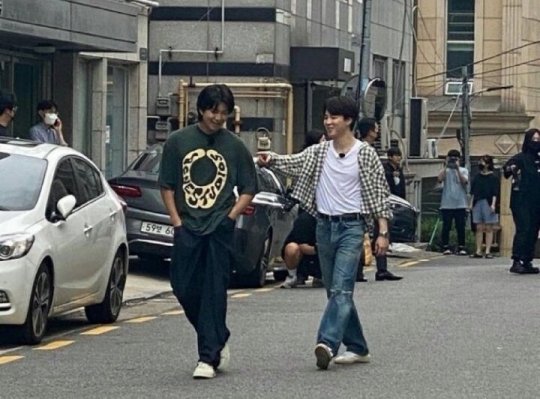
Robotics. I would love to see them try this but so far, not any evidence that it might come to pass.
Crafts, accessories, friendship accessory (jewelry), silver. Of course, this was Jimin’s Vlog.
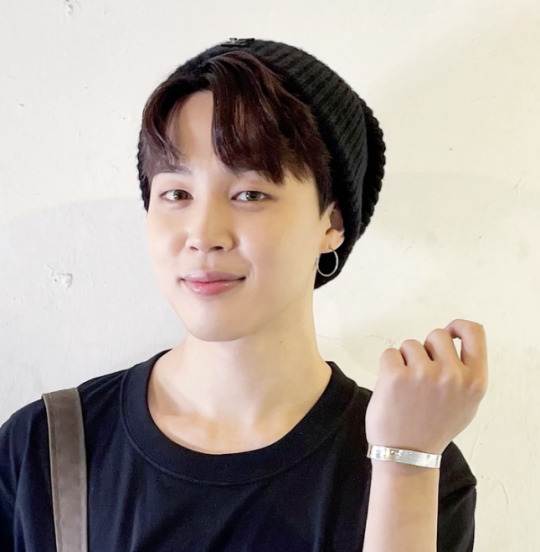
Hide and seek police and thief game on a large scale. This would be interesting.
Jin’s presentation:
Maze, large scale or 7 identical rooms and each has as much time as they need to escape it. Escape room type thing. I am thinking they did something like this in the past.
Scavenger hunt on a mountain (rent a mountain hahahahaha, money is no object for Jin) similar to the one they did on ATVs but this time walking/hiking. I would love to see this.
Classic childhood games, throwing at a target, hopscotch, rubberband, spin tops, etc.
Tae's additional idea:
Mafia village role play game where each member plays a character they need to really get into while the game is ongoing. They did this in Ep. 120 Dec. 15, 2020 when they role-played and searched for clues in real buildings, and in Ep. 121 when they continued their missions but at the end of the episode they got transported back in time to Joseon Dynasty and those episodes were 145, episode 146 and 147 which aired August 2021.

Namjoon’s presentation:
Create Run BTS theme song (ost) using simple objects. They did create a Run BTS song but it was far from simple. It’s a banger and apparently going to be used as the ost for the Run BTS reboot!
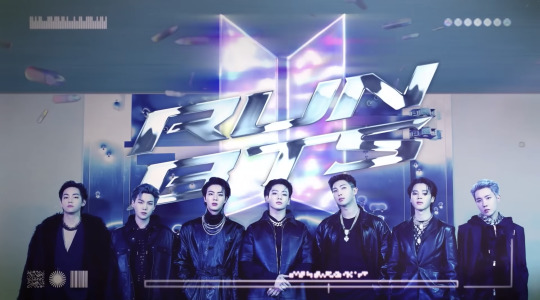
Lucky 7 with simple things (the childhood games idea), flipping bottle competition, bottle caps, etc. Run BTS episodes 126 and 127 were titled 777 Lucky Seven 1 and 2.
Fan merchandise. Of course this is the Artist Made Merch we fought the Hunger Games for at the beginning of this year. These items were already in the works by the time this brainstorming episode aired in January 2021 as the planning stages began in late 2020.
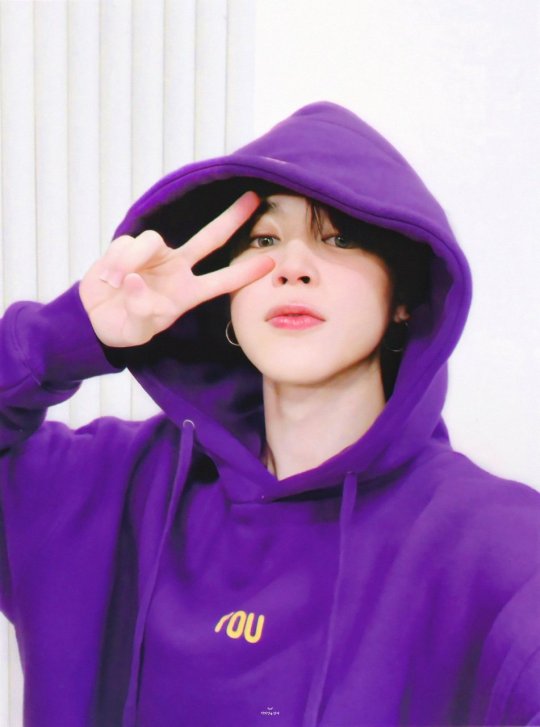
Jungkook’s presentation:
Photoshoot for editorial pictures. THIS is where Vampkook originated. This is the Photo Folio idea.

He brought up team sports again and everyone discussed different sports.
Jimin brings up shooting a music video for a b-side song and JK says he had that idea as well.
In the second part of the episode they reconvened at some point within the following month and a half and they narrowed down the short term and long term ideas:
The results:
Short term show themes: Role play Mafia game and Lucky 7 games. These were episodes 120-121 and 145-147 and Lucky 7 games were episodes 126-127 as mentioned above.
Long term project: Learn a team sport and all kinds of sports were listed: basketball, tennis, volleyball, dodgeball, baseball. As it turned out, tennis was the chosen sport and it played out in episodes 129 and 130. We know Jin ended up taking on tennis as a hobby because we’ve seen a Bangtan Bomb as well as Jin posting on his IG his late night tennis practices and we’ve seen Jimin and Jungkook going to their tennis lessons together for which I cannot find the video but here someone posted a clip of it on twitter.
So...that leads us to why I started this post in the first place: Photo Folio which was Jungkook’s photoshoot idea. We are getting photos and maybe behinds I think.
And the other ideas they brainstormed...I wonder if we will see they have learned music instruments since we know Jungkook carried his drumsticks everywhere. Playing music instruments as a band, a b-side song music video shoot, large scale maze, robotics, hair designer, Bangtan in disguise...all ideas we are waiting to see realized. They did so good coming up with ideas.
NOTE: I believe the brainstorming episode 124 was filmed in 2020 because they spoke about social distancing. The first part of the episode with blonde Jimin was filmed probably March 2020 and the second part with black hair Jimin was filmed probably late April or early May before the 28th because by then Yoongi had black hair.
#Run BTS the show#vampkookie#i got to watch a bunch of Run BTS shows for this post#i would love to see them playing instruments on stage#i think going to concerts where artists play instruments has influenced them#i see a bruno mars/anderson paak vibe#one can dream and hope#bts chapter 2#blonde jimin
34 notes
·
View notes
Text
Mitski Birth Chart Reading
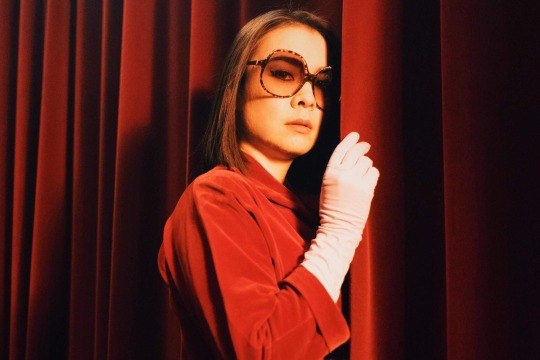
This is just my interpretation based on Mitski’s birth chart and what I know of her music. Let me know if you have any suggestions of someone I should make a post on next! If you’re interested, I offer natal chart readings, just check my pinned post!
Libra sun: In terms of basic personality and ego, Mitski is focused on creating balanced, harmonic relationships. Intimate, one-on-one relationships are a major part of her identity. Libra is ruled by venus which represents love and beauty. After all, she is known for her lyrics relating to her romantic relationships. The lyric “I love everybody because I love you” is so profoundly Libra to me. She is friendly and charming. She sees herself reflected and other people and people see themselves reflected in her (for better or worse). Venus also rules the arts and Mitski is a natural artist in every sense of the word. Her music sonically is very unique, inventive, and creative as she experiments with mixing different genres. This is influenced by her sun in the 11th house. Sun in the 11th house also indicates an emphasis on friendships and memberships of certain groups and communities. It also indicates an importance of her hopes and dreams. Her sun in 3° explains why she is such a talented writer, communicator, and lyricist. Peak libra sun culture: “Young adult romance is the shit” (a real quote from the queen herself). And let’s not forget her iconic quote from 2016: “I’m a libra so my sexuality is essentially “you can really be any gender as long as you treat me like a princes.” Truer words have never been spoken.
Capricorn moon: Despite how personal her music is, Mitski is a rather private and reserved person, particularly when it comes to expressing her emotions. Also, Capricorn is associated with the father and she has been known to be especially private regarding her dad’s career. She is serious and intense with emotions but can sometimes get detached. The emphasis is on having control over her feelings. She is ambitious and a practical person. Her emotions are connected to her career. Those who do not know her well may see her as cold. In temperament she tends to be melancholic. Emotionally mature and wise beyond her years. Straightforward and honest with her expression. She is dependable, loyal, hard working, & realistic. Emotional fulfillment is often tied to achievement and success. Her moon in the 2nd house and 2° suggests material comforts make her feel safe. With the 2nd house being associated with venus, she is able to express her emotions in an artistic way. Could be protective over material objects. Sentimental. Music has a big impact on her emotions and mood. Peak capricorn moon culture: “I didn’t really feel anything. I’ve stopped feeling things for a long time” - Mitski, The Fader Interview, 2017. In all seriousness, I hope my capricorn moons are doing good.
Virgo mercury: Mitski is practical and detail oriented when it comes to communication and matters of learning. She takes the time to choose the right words to convey her thoughts. She is clear and concise. Mercury is in its sign of rulership here. Her mercury in the 10th house suggests that she will be known for her communication style. Has a lot of thoughts but is also organized. Analytical. Mitski likes making lists. Loves to give advice. Mercury is in 16° (cancer degree) and she has a soft spoken voice. Talks about the past and her roots (cancerian themes).
Virgo venus: In love, Mitski will assume a caretaking role and will gladly help her partner finish mundane tasks and chores. A devoted and faithful lover. Love is about the mundane and routine details of life. Love is about service. Acts of service tend to be virgo venus’ main love language. She wants to help improve her partner’s life. She is patient and observant. Values love that is simple and authentic. Appreciates a partner with whom she can have intellectual conversations. May have a tendency to be too critical on herself when it comes to love. Venus rules aesthetics & style and she tends to have a modest fashion sense. Mitski has voiced her interest in astrology and how she has asked people she’s interested for their birth times lmao. Her venus is in the 11th house, she treats a lover like she would treat a friend. In fact, romantic love probably equates to platonic love in her book. She has her venus in 24° which is a pisces degree, which explains this natural interest in astrology.
Gemini mars: Could be impatient because she moves quickly. Efficient. Has a lot of goals and likes to keep busy. She thrives when she talks to others and exchanged ideas. Likes to multitask. Very versatile. Probably has a flirty, bubbly energy when she’s attracted to someone. Attracted to intellect. Desire to see things from multiple perspectives. Gemini rules the hands so she’s skilled with playing instruments and writing. Likes to try new things. Witty and humorous. Could have nervous energy or fidget often.
Leo jupiter: The planet of luck and expansion in Leo is a big indicator of fame. Her jupiter is also in the 9th house and in 7°. Jupiter in the 9th indicates being born in a different country from where you reside now. Mitski is biracial and has lived in multiple countries growing up. She loves to learn, particularly about other cultures and ways of life. She is open minded, philosophical and values freedom and being independent. She attracts good fortune when she travels (touring!) and also when she focuses on partnerships/intimate relationships (7°). Combining this energy, Mitski attracts luck when she acts dramatically, demonstrates/teaches her knowledge, expresses herself artistically, shows her warm hearted and sometimes stubborn side, & takes chances, shows her bravery, and takes the lead. Be the Cowboy is big leo energy 🤠
Capricorn saturn: Mitski is responsible, practical, goal-oriented, and cautious. With saturn in the 3rd house, she probably had to grow up quickly and become mature at a young age. Capricorn saturn people tend to be very successful people. Strong willed. Tendency to be quiet and is a good listener. Could also be outspoken. With saturn in 18° (virgo degree), she’s very hard working but she may need to learn how to take a break and let herself rest and recharge.
Capricorn uranus: This placement also indicates that she goes after her goals and is efficient and practical in achieving them. Uranus being in the 2nd house shows that she could make money from being unique and groundbreaking. 2nd house also rules the voice! Her values are unique and she could be resistant to change them. Her self esteem could be in a constant state of flux and be tied to money. Her income could rapidly change, like maybe she did not get paid much but then suddenly she starts making a lot of money. Uranus is in 5° which is a fame degree. She’s famous for being authentically herself and very much an individual in the industry that can’t be compared.
Capricorn neptune: Capricorn neptunes are most likely realists. She is skilled at going after her dreams. Her dreams are practical and connected to themes of wealth, power, and control. Neptune in 3rd house shows a dreamy, poetic way of communicating. A very creative placement. Dreamy vibes. Could be elusive in communication, open for interpretation. Neptune is in 11° so this gives aquarian energy. Idealistic with friends and always searching for ways to achieve her dreams.
Scorpio pluto: Her power lies in her ability to analayze human interactions and be introspective with herself since it’s in the 1st house. She is very self aware. Mitski understands that life is about going through changes and she welcomes the ability to grow and rebuild. She has intense, deep emotions but has control over them and how she expresses them. Pluto in 16° adds a cancerian energy. Her strength lies in her ability to nurture and be empathetic.
Scorpio rising: First impressions of Mitski can be that she’s mysterious and secretive. A powerful and intimidating presence. This explains to me why she loves dressing in black. She probably has a strong dislike for anything superficial. She likes to get to know people on a deeper level and connect with them. She likes honesty and is probably very perceptive and intuitive. Privacy is so important to her! She has a lot of layers and wants people to unpack them, but it may take her a while to open up. She is powerful and has endurance. Her presence leaves an impact on people. Loyalty and intimacy is important. She’s not afraid to talk about taboo topics or scary, heavier emotions. Passionate and even a tendency to get fixed on or obsessed with something or someone. Her rising is in 15° (gemini degree) so she’s clever, curious, and thinks quickly. a little more flexible than a regular Scorpio rising would be.
Leo midheaven: People might see her as dramatic or arrogant. In the public eye, she was meant to be a performer. At her concerts she’s known for putting on a good show & includes interpretive dance and choreography. She becomes herself more when she’s on stage. The stage is where she shines. Has a lot of pride connected to her career. Reputation for creatively expressing herself and being brave and taking risks. Wants to be admired, especially regarding her career. Her purpose is to become a leader. Mc in 22° (capricorn degree) shows that she is a very hard worker when it comes to her career. She won’t let anyone stop her when it comes to achievement and success in her field. Another indicator of being at the top of her career and being publicly recognized for it!
TLDR: Mitski is a natural born singer, performer and artist. She is unique, talented, and an introspective writer. Being earth and water dominant, she balances practicality & stability with sentimentality & raw emotion. With all of her Capricorn placements, she is grounded and doesn’t let fame get to her head. Her chart ruler is Scorpio pluto in the 1st which means that major transformations will be a big theme in her life, especially regarding herself & her identity. She is always reflecting and looking at herself on a deep level.
#mitski#astrology#astro blog#astroblr#astro community#astro notes#astro observations#astrology observations#astrology notes#birth chart#natal chart#birth chart reading#natal chart reading#libra sun#capricorn moon#scorpio rising#celeb charts#aries#taurus#gemini#cancer#leo#virgo#libra#scorpio#sagittarius#capricorn#aquarius#pisces#working for the knife
204 notes
·
View notes
Text

The World Unknown to Matsuko aired April 6th.
Music that ended up evolving A LOT in the age of social media Special: "The World of Visual-kei bands"
(I'll be just doing the main points of the program)
They start with introducing Fujitani Chiaki (藤谷千明) who's been following v-kei world as a fan and a column writer for 25 years now ('a former Self Defense Force member who came to love over 100 bands in 25 years').
The slogan on the screen that accompanies this is 'The great pick up of ultimate bands starting from legends to evolving styles (kei)'.
Chiaki's life changed after she saw LUNA SEA's "ROSIER" in junior high. When she was 18 Kuroyume announced they're stopping activities and shocked she decided to enter Jieitai (but it was also because there were very few employment chances in her hometown).
A message Chiaki wants to convey the most in the program: "I'm fed up with realistic times, let's experience the extraordinary more".
Matsuko commented that she also thought that the entertainment in Japan is very plain/reserved, that's why she thought about visual kei, she brought up Sawada Kenji (ジュリー). They talked about using make up talking about Kpop as well, that v-kei is so different.
Next came teaser "tremendously popular in the 90s" - "the word 'Visual Kei' became established overseas" (as background here they showed dir's footage and some foreign fans wearing vkei style).
Chiaki: nowadays Japanese people have an image of Visual-kei as 'old', 'scary', 'behind the times' and they both talk about tylhe extraordinary being important.

Next part "after 22 years the time has come when Visual-kei is necessary!" They talk about the chronology board prepared by Chiaki, she also explained that the genre was born in 89 with X and the term visual came from X's PSYCHEDELIC VIOLENCE CRIME OF VISUAL SHOCK.
1994 faced restructuring and unemployment crisis, they showed LUNA SEA's TRUE BLUE and commented how popular it got. 'how did Visual-kei fare in such difficult times?'
Matsuko brought up SHAZNA - everyone was shocked then how cute the vocalist was.

Then they talked about 1999 and Nostradamus and end of century, Chiaki sees 1999 as a peak of visual-kei. They talked about GLAY's legendary show at Makuhari with 200,000 people (they also show their best album sales, about 4,870,000 (the top 3rd in Japan)) and how much media attention it got.

Another legendary show that was held that year was LUNA SEA's 10th anniversary with a stage that costed hundred millions of yen. That stage got destroyed just 3 days before the concert due to a typhoon but band decided to go on with plan and held the concert as planned.
(haha I can totally see Chiaki's sparkling when she talks about LUNA SEA😆)
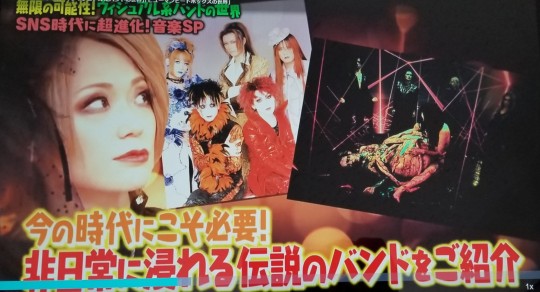
"Totally necessary for these times! Introduction of the legendary bands immersed in the extraordinary":
🌙MALICE MIZER: 'immersed in extraordinary with super extravagant costumes! ultimate visuals with extreme beauty'
Matsuko commented that performance (from merveilles~終焉と 帰趨~l'espace) looks like Takarazuka. Chiaki said that for the sake of worldview they don't play instruments on stage and that Sho Kiryuuin from Golden Bomber was very influenced by them.
Matsuko said that fans of course want to see the artist perform, but also are happy to see them dance, that visual-kei is infinite.
Matsuko also compared Mana to Marie Antoinette.
🌹Chiaki then introduced Versailles as a band that still pursues such worldview. They are dressed as French aristocrats, are very popular abroad especially in France.
💀DIR EN GREY: 'extraordinary performance going to the very end'
Matsuko knows dir, Chiaki explained for the audience about their major debut with 3 singles produced by YOSHIKI, that they are popular overseas as well as in Japan. They express 'human pain' and 'the darkness of the heart', the peak of extraordinary. Chiaki talked about the situation with M Stage program when the tv got complains from parents after their kids cried seeing dir on tv, Mstage was on tv just before Crayon Shin-chan and many ended up seeing one of dir's songs (I love how someone burst out laughing in the studio here😂). Matsuko asked what kind of performance was it:
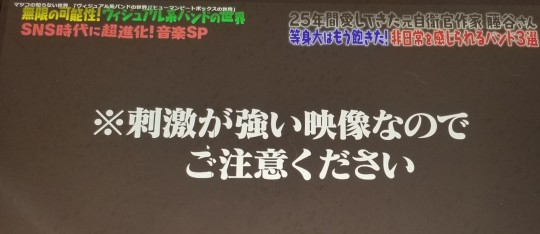
"The following footage contains material not suitable for all audiences"🤣🤣🤣

and of course it's 残-ZAN-
Chiaki: The shock received in your own living room...
Matsuko: certainly, suddenly seeing this kind of deathmetal
Matsuko: something that Tamori (Kazuyoshi Morita, tv celebrity/presenter/comedian) could suddenly introduce
the commentary: 'and even in recent performances' (they proceed to show dir's live footage from DSS in Nippon Budokan)
Chiaki comments that as dir's lyrics are about the pain and extraordinary, and how cathartic can be a very intense show, and she really loves how 'we love the extraordinary in order to deal with the ordinary life' (yes😭❤️)
Matsuko: ... really? But they have songs so deathmetal like. Ok, I guess I'll check them out.
Chiaki: I just heard from the staff that dir's vocalist, Kyo, is a fan of this program and is watching every week.
Matsuko: who's here connected with the band?? (asking the studio people)
Staff (from behind camera): when getting permission [to show dir's footage] I was told that.
Matsuko: so in a sense I'm deathmetal too. Ok, I think that's it.
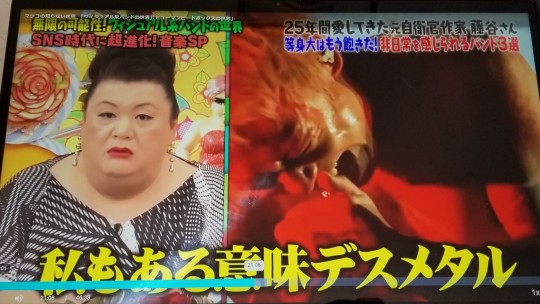
Next the program moves on to "a mystery hot pot eaten in the dark of performance incorporating all trends and fashion"
Matsuko: is 'Yaminabe performance' a band's name? Ah, ok, no, we're changing the topic!
Chiaki explains that it's difficult to explain what visual-kei bands are like now because there are so many elements.
They show the Raid (manga style) and Kiryuu (Japanese horror) as examples of the 2nd generation of evolving visual style, and what elements entered visual-kei: rap, dance, underground idols, Japanese kimono, ???

Matsuko: is the bottom right visual-kei??
Chiaki: has common elements (くくり)
●they show NOCTURNAL BLOODLUST and talk about their image and Hiro, the vocalist. the ??? gets changed into 'muscles', they comment on change in the expectation that musicians are very skinny.
Matsuko comments she personally likes the look of the 'underground idols', like what are they actually doing there?
●They show 0.1gの誤算 performance and Chaki explained anything can happen there. They also showed their recent show where fans prerecorded their shouts and member calling on their phones to play them when loud response is not allowed due to covid.
●Alice9 represents 'dance' element.
●CHOKE represents 'rap'
●Mogamigawa Tsukasa for 'kimono', the drummer in THE MICRO HEAD 4N'S who's singing enka.
The 2nd half of the program introduced humanbeatbox topic (very cool to watch but no report from that part😅)
#dir en grey#luna sea#x-japan#malice mizer#gackt#glay#shazna#golden bomber#Versailles#the raid.#己龍#アリス九號#nocturnal bloodlust#0.1gの誤算#choke#the micro head 4n's#translation
143 notes
·
View notes
Text
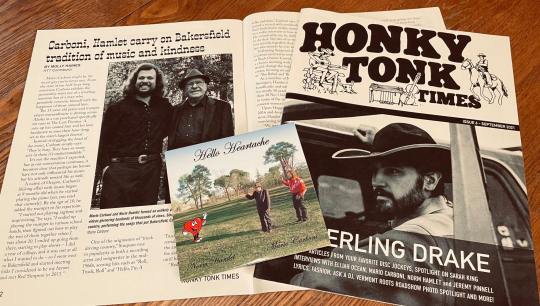
The September issue of Honky Tonk Times is available now at thehonkytonktimes.com. This month I interviewed Mario Carboni and Norm Hamlet, who served as Merle Haggard's bandleader and steel guitar player for over 49 years. These interviews are a dream come true!
Carboni, Hamlet carry on Bakersfield tradition of music and kindness
Mario Carboni might be the nicest guy you’ve never met. From the start of our half-hour-long interview, Carboni exhibits the personality traits not of a traveling musician but of a man who genuinely concerns himself with the happiness of those around him. The 35-year-old piano and trumpet player extraordinaire is driving across Alaska in a van purchased specifically for runs in The Last Frontier. A mix-up has caused him and his lone bandmate to miss their hour-long set at the state’s largest festival. Instead of dogging the head of the event, Carboni simply says: “They’re busy. They have so many acts in there it’s understandable.” It’s not the reaction I expected, but as our conversation continues, it becomes clear that perhaps his heroes have not only influenced his music but his attitude toward life as well. A native of Oregon, Carboni’s lifelong affair with music began at 9 months old when he started playing the piano (yes, you read that correctly). By the age of 10, he added the trumpet to his repertoire. “I started out playing ragtime and improvising,” he says. “I ended up playing the trumpet in various school bands, then figured out how to play the two of them together when I was about 20. I ended up going from there, starting to play shows – I did a year of college, and it was not at all what I wanted to do – so I went over to Bakersfield and started meeting folks I considered to be my heroes and met Red Simpson in 2015.” One of the originators of “truck driving country,” Simpson rose to popularity as both a recording artist and songwriter in the mid-1960s, scoring hits such as “Roll, Truck, Roll” and “Hello, I’m A Truck.” The Bakersfield native remained a permanent fixture in the area's music scene, coming to the aid of many aspiring musicians until his death in January 2016. “Red was always helping younger folks and kids,” Carboni says. “He’d record a record with somebody in their little home studio, mention them in a radio interview or tour with them. He toured with me; he didn’t have to do that. The two of us recorded two records together; they were the last two records he ever recorded.” Following Simpson’s death, Carboni received an invitation to play at Buck Owens’ Crystal Palace, where a chance meeting with Norm Hamlet would change the trajectory of his career, forming an unlikely duo billed as “The Rebel and The Stranger.” As a member of Merle Haggard’s Strangers, Hamlet served as bandleader and steel guitar player for nearly 50 years, playing on more than 30 No. 1 hits and performing in some of the most recognizable concert venues in the U.S. Upon Haggard’s death in April 2016 and despite his age at the time, Hamlet too found himself wondering what would come next. “We were both hired to play in a band at Buck Owens’ Crystal Palace, and we started talking that night,” Carboni recalls. “I asked him if I could have his number and eventually called him up and told him I’d like to shoot a video of the two of us playing three songs; I’d pick my three favorite songs that he’d recorded on. We filmed this series of videos and put them out. I think there was one of ‘No Reason To Quit,’ another of ‘The Roots of My Raising,’ and it was really special to me because he’d played on the original hit with Merle in the ‘70s. I told him I could never afford to pay him what it was worth, and he was very nice to do that for me. “We put them out on social media and turned around a week later, and they’d hit 600,000 views each or something like that. I called him up and said, ‘Hey, this is significant. We should start a project.’ We started talking a little more about it, touring a little bit more and more dates started coming our way. It seems like the more stuff that we do, the more stuff people want to hire us for, and it just snowballed from there to the point where we’re touring the country.” For 86-year-old Hamlet, whose career began nearly seven decades ago and whose resume also includes working with Rose Maddox, The Farmer Boys, and once as part of a band opening for Hank Williams, the decision to return to the road
seemed like the natural course. “Mario had such a charisma about him,” Hamlet said. “When he played music, everybody loved his singing and playing, and I thought the same thing. It had been a long time since I’d seen a piano player that plays as good as he does, so I thought, ‘Well, I might still try to go out there and play a few things.’ This turned into a good job. At my age, I didn’t know how long I’d be able to go out and do it. As long as I can do it health-wise, we’ll keep going out there.” In addition to their busy tour schedule, the two recently completed their debut album, "Hello Heartache," a collection of 10 songs recorded aboard Carboni's tour bus, affectionately dubbed "Ol' Red," on the streets of Bakersfield. Of the 10 songs, eight were written by Carboni and Hamlet. “Most of the songs are upbeat in the Bakersfield sound, traditional style, with a slight twist of the piano being the rhythm and bass instrument instead of a traditional instrumentation,” Carboni explains. “. . . The album also features dobro played by Norm on one track called ‘Miss the Mississippi and You.’ We brought the instrument out of the museum in Nashville to record the album. The last time it was on a recording session was in 1969 on Merle Haggard’s ‘Same Train Different Time’ album.” For now, the album is only available at the pair's live performances, which Carboni says features a mix of songs made famous by some of Bakersfield's heavy hitters, including Haggard, Buck Owens, and Simpson. "They call it a second career when somebody does what Norm's doing, I guess," Carboni says. "He helps me out by playing with me; we help each other out. I get to be his rhythm section, and he lends his incredible reputation to what we're doing, and that's a really special thing, that's important." The pair has several dates scheduled for September. To view their complete schedule, visit www.honkytonkrebel.com. As for the aforementioned festival performance, Carboni and Hamlet were given a time slot for the following day, proving once and for all that nice guys don't always finish last. At least not the ones from Bakersfield.
22 notes
·
View notes
Text
Animate Times Interview with Centimillimental

Discussing his journey so far and his love for this series, saying that he “felt something like fate” upon coming across “Given”! Interviewing Centimillimental, who did the theme songs and sound production of the summer anime “Given”.
The artist Centimillimental composed the opening of the TV anime “Given”, which aired in Fuji TV’s Noitamina and gathered a great amount of attention. Garnering comments about the sound production of the show’s band, Given, he released the opening theme “Kizuato” as a single on September 11!!
This is the debuting work of the solo unit Centimillimental, in which Atsushi-san does the vocals, keyboard, guitar and programming. In this article, which is surprisingly his first-ever interview, we shall introduce plenty of his journey until reaching this point and his thoughts regarding “Given”!
His current style was earned through “wanting to express joy and sorrow with music” as much as possible.
——Thank you for your time today!
This is actually my first time being interviewed (laughs). I will be in your care.
——Your first interview?! Please let us ask all kinds of questions. Firstly, could you tell us about the origins of Centimillimental?
Although it has the name Centimillimental, this is a solo unit. Rather than a singer and songwriter, I am more of a solo artist with a band stance. But it was originally a band. The band name remained just the way it was... that is all.
——What sort of band was it?
A four-piece one, with myself in charge of the vocals and keyboard. The band had a style close to pop, with a lead guitar, bass and drums, but the members pulled out one after another... Ultimately, I was the only one left. For that reason, people from the live concert houses were quite uneasy. Like, “Does the vocalist have a nasty personality or something?” (laughs).
——(Laughs) That is so not true.
Each one quit for their own reasons. But I had an obsession with the band, so I was like, “I’ll do this even if it’s just out of stubbornness” (laughs). And so, the band name stayed.
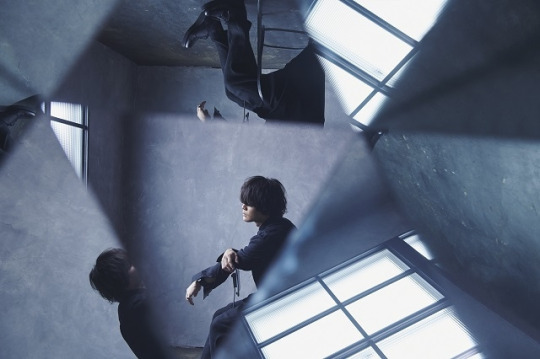
——Atsushi-san, what are the roots of your admiration for bands?
My root is Remioromen. I actually used to play classic music. I was so much of a classics boy that I would... turn off the TV whenever a music program was starting, but when (an insert song) “Konayuki” started playing in the drama “1 Liter no Namida”, which I watched back in fifth grade, it had an impact on me. Like, “So a singing voice can be this cool when it accompanies a melody”. From then on, I began looking up to bands.
——How did you handle classics from that point onward?
I continued playing for a long time, until I was around 20 years old. But then I was charmed by pop music and could no longer dedicate myself to classics (strainer laugh). I used to dream of becoming a pianist, but I felt that the mindsets of classics and pop were different, and then chose the way of pop.
——When you think about it now, what do you believe to have been the reason that a classics boy had his heart stolen by pop?
I had the feeling... that something more essential for my inspiration was set on fire, so to say. I think this something also exists for people who like classic, but in my case, I personally felt joy at the fact that “their singing voice is cool”, “their words pierce me”. So I was like, “This is what I actually prefer”. Also, I was drawn to the freedom of pop. The world of classics is devoted to music sheets, so in concourses, for example, it is important whether or not you can play true to the sheets, but I end up playing the way I want to on my own accord. Which is why the judges’ votes became worse year after year (bitter laugh). During this, there were also people who told me, “This is an insult”... But if I were in a world of originals where I could give birth to my own songs, wouldn’t my beliefs be justice? So I started to think that I was “the kind of person who wants to express himself freely”. To begin with, I have liked creating things since the distant past. I used to write stories of my own and making picture books with them in preschool, and from first grade on, I would be writing song compositions and poems. At any rate, I like creating things, so wouldn’t making them freely suit me better?
——So, if it is on the topic of “wanting to create things freely”, the way you are now is best, in a sense?
That is right (laughs). My degree of freedom has increased ever since I went solo. One of the reasons the band did not work was that my ideals and the image of my unshakable, inertial nature were very strong. I believe that so-called bands are supposed to get together in a studio and consolidate and gather up arrangements, but right as we formed ours, I would take the stance of writing down everyone’s parts and saying, “I want you to play this”. So I think that the current Centimillimental is what turned out from me doing everything I could, the place that I was supposed to reach.
youtube
——Nowadays, you are in charge of all parts, right? Did you play instruments other than piano from the start?
That is not the case. When our guitarist left the band, I did not want the quality of our music to be reduced, so I thought about supplementing it somehow, then learned how to play guitar. Also, I had to put my heart into it, but I started studying bass and drums when the others left, wondering if I could cover for them. The fact that the members pulled out had an influence on it.
——How was it coming in contact with instruments besides the piano?
The structures are completely different. Bands are formed so that each person can compensate for the other. When it comes to the beauty of such arrangements, I came to feel them more keenly the more I delved into them. And then I started obsessing with the arrangements.
——After these twists and turns, did Centimillimental become in 2015 what it is now?
No, there were actually twists and turns from this point on too... There was once a time when the band became just the bassist and me. Back then, the band was not doing too well, so we decided to do a different unit. That was the band called “Nee, Wasurenaide Ne” (“Hey, Don’t Forget”). In the end, I mostly had to do it by myself, but doing things separately from the main activities gave me a high degree of freedom. And then people started finding us interesting and we gradually earned their praise. For me, that was extremely frustrating (laughs
——So it became a “sub”-like band.
That is right. And then I thought about quitting, so I applied for an audience as a commemoration for quitting, to make one last memory... but then the work I had applied won a Grand Prix. I was like, “No way!?”. This happened in summer 2015. And that was when the main and sub switched (laughs). And so, only the band’s original name remained. The label respects us in the sense that we “can make the music that we always wanted to”.
——What is the origin of the band name “Centimillimental”?
“Remioromen” is a coined word, so I looked up to a coined word in katakana. I personally like katakana. Plus, I like “sentimental” things. That sentimental feeling when you are going home after a fun day thinking, “Today was a good day” and it suddenly makes you feel lonely, or that sentimental mood from when you are purely sad... I believe that sentimental emotions regarding anything are something that we should nestle close to. I had this thinking that I want to express joy and sorrow with music, so while using “sentimental” as the pillar, I added the “milli” with the meaning of “not being too caught up with it”.

——Come to think of it, both “Given” and “Kizuato” are written in katakana.
I guess I have a connection with katakana (laughs). If the words are in kanji or in hiragana, doesn’t that change the appearance and interpretation of each? While katakana has a coldness to it, it doesn’t feel too sharp. I have the feeling that these kinds of words are interesting.
“Gender doesn’t matter when you’re in love with someone.” – He also has experience with composing music having a BL series as the impetus?!
——How did you feel when you received the proposal about “Given”?
It was the first tie-up of my life, so I turned into a mess of nervousness, uncertainty and expectations. But “Given” is a series about music and the theme is bands, which was something I looked up to. Moreover, rather than just the sparkle and shine of a band, it also focuses on sadness, the tremor from losing something... these delicate parts of it.
I think music has a close relationship with meetings and partings, so I felt happiness to be involved with a series that faces this directly. It was like something that was supposed to come at me had arrived, and at the same time, I felt something similar to destiny. That was my first impression.

——The sensible portrayal is one of the charms of this series, right? I read on the topic that this series was the first-ever BL comic that Noitamina has adapted into anime, and there is an indescribable appeal in the words “boys’ love”...
It allows you to smoothly immerse yourself into their worldview, right?
I have bought a BL manga in the past. In my middle school days, buying a book after looking at just the title was trending. At the time, what I took in my hands was a short story collection titled “Saigo no Sangatsu”. I thought at first, “I might’ve jumped into a terrible world!” but turns out it was a really good work...
Gender doesn’t matter when you love someone; it’s all the same. It was a really good work, so I was quick to wrote a song for it (laughs).
——That is a good story. By the way, did you use to watch anime back then?
I was not the type to watch anime in-depth. But what I thought to be odd was that, whenever you finish watching a series, doesn’t the way that you listen to the opening themes, ending themes and insert songs change?
Through the filter that is the series, the tone of the music changes, and the story stands out instead as the music overlaps with it... While watching, I would find myself thinking that this way of snuggling up to the music was interesting.
——What were your impressions when you read the original work of “Given”?
Kizu Natsuki-sensei’s focused viewpoint on pain is quite sharp. Her poetic depictions, which sometimes get you caught in them, are impactful and sensible. I thought it was a series that cherished words a lot. Since it is a manga, I think the art is the main point, of course, but I felt a literary beauty in it that resides not just in the drawings. It also felt close to the world of songs that I take part in, so I truly had the feeling that it was fate.
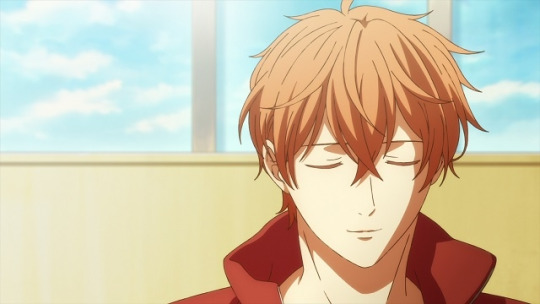
——So the image of the song came readily to you?
Right you are. That is where I arrived once I wrote down my own perspective of romantic love and the ways that people become involved with each other. The sense of suitability was incredible. That’s why I was able to write it so frankly, managed to say what I wanted to, and got close to the series. I feel that the compatibility was really good.
But of course, there were walls. I write even the arrangements by myself, so I had to make changes over and over, and I had never had any experiences with being the producer of a band before, so there were things I was not used to. Also, my main instrument is the piano, but there is no piano in the show. That’s why I had to delve into the guitar, so there I had a hard time sound-wise...
“I want it to be an important song for everyone from ‘Given’ too!”
——Can you tell us about your particularities regarding the sound of “Kizuato”?
For the anime size version, I purposely sealed away the piano and classic strings that I had been specializing in until now. For the whole song, in order to nestle closer to “Given”, I cherished the band’s scene, with a guitar, bass and drums.
——I felt a big meaning in the fact that it starts with a breath. Is it something that you gave importance to?
I like the sharpness of songs that start with the singing. That feeling of getting taken aback without thinking. Same goes for sighing - I feel that people’s emotions mount on their breathing. Through “the drawing of a breath”, you can sense a beauty and strength unique of vocal songs. For that reason, I cherished the breaths from the very start.
I also think that the breaths are very important in “Given”. For example, in the teaser trailer, the video ends with a breath, and in the PV, the scenes change with breaths too. That’s why I think it was good to be able to start the song like this.
youtube
——I felt that the lyrics portrayed the sensible feelings of all four, starting with Mafuyu, but how was it made?
They are human beings, so I think there is definitely a part of their emotions somewhere that they can share. The loneliness and agony of losing something, the conflicts of loving someone... anyone has that. I looked for keywords that would connect everyone from “Given”, including me. For me and for all the characters that appear in “Given”, it could not be a lie...
——The “four seasons” bit in the lyrics was also a good keyword.
I think that is one of the main points of the series, and that this part of it can connect even within me.
——The words “I can hear it and it’s still real, so I’ll carry your heart in your place” from the latter half are extremely painful, but at the same time, it conveys resolve and determination. Were you conscious of the machinations of their hearts or something like that within the song?
I think it is wonderful when emotions get into motion as the song goes on. Aren’t there moments in everyday life where wounds heal little by little and changes of heart where we try to get back on our feet even if they do not heal? I like story-songs that head towards hope in this fashion. I also want everyone in “Given” to be happy. I gave importance to how they should head towards hope while sharing those wounds.
——The song changes dramatically after the aforementioned verse.
I finished it with a classic orchestra sound. That is one of the strong points of my music, so I had the desire to approach “Given” through it. If I sealed away my music too much and made it into just a “Given” song, it would feel like I was standing on formality. I am a person who gets hurt and even so lives on crying and laughing, just like them. I pieced together that part of the song because I wanted to convey this message.
youtube
——So you let your uniqueness show in order to join hands with “Given”. Indeed, both with love and friendship, getting close to the other person is not all there is to it.
Right. That alone is not a connection, and you end up concluding that your own love is too deep... I believe there is a 50:50 beauty to it. Isn’t that what acknowledging one another and joining hands means?
“Kizuato” is my debut song and an important song for me. That’s why I also want it to be an important song for everyone from Given (the band). I thought about intersecting that. After thinking a lot, I managed to change the charm between the anime size and the full size.
At the beginning of the A-melody from the second chorus, I tried changing the rhythm, transforming it into an electro loop, and did all sorts of approaches. I hoped it would be wide-ranging as music.
——How did you feel when you watched the opening?
I was extremely moved. I had gathered with all the recording members to watch it, and everyone shared their joy too. It was a really good scene.
Having my own music playing in sync with an animation was my dream, so I was tremendously happy, and I felt like I had connected with the viewers who had the same feeling... I was truly overjoyed.
When I looked on Twitter, people had written up several opinions, making me go, “So there’s this many people enjoying my music”.
“It’s exactly because the desire to protect someone isn’t something simple that we feel uncertain.”
——Other than the OP, you also did the sound production of the band Given, so what impressions did you have from the production work?
I already liked production work to begin with. Until then, I had been doing producer-like things, such as arrangements for the musical compositions of artists around me, but this was my first time doing production as a job.
I mentioned Remioromen earlier, but I also looked up to Kobayashi Takeshi-san, who was Remioromen’s producer as well, so I had also wanted to work on production one day.
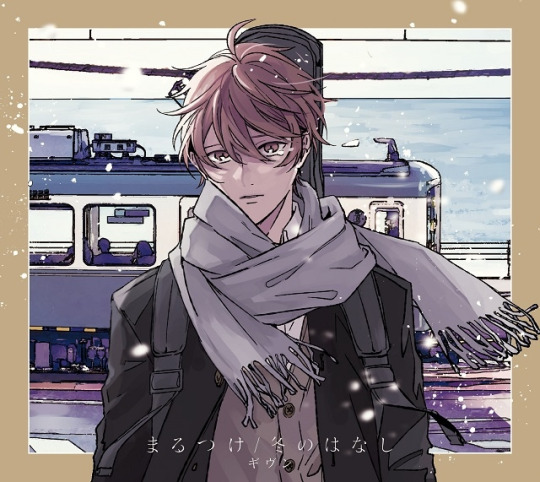
——Given’s debut single, “Maru Tsuke/Fuyu no Hanashi”, was released on September 18 2019. “Maru Tsuke” is also included in Centimillimeter’s single as a self-cover, but what kind of route did you take to complete this song?
To tell the truth, I had a song called “Maru Tsuke” for quite a long time. I already had its base form since 2015, so the song was in a state similar to an accompaniment material.
“Maru Tsuke” came into light during the meetings, and I didn’t think this song would have made it into the topic of discussions, so I was surprised. I was anxious at first, but when I tried facing it once again, there were so many fitting aspects to it that it even made me say, “So it can get this close to the series”. I felt like it connected with “Given” on a deep level, despite not having written that song for it.
——Holding someone dear, becoming a coward because of it, shouldering all sorts of feelings, and continuing to live in spite of that... What you talk about in “Maru Tsuke” might be things that everyone thinks.
The moment you start loving someone, you feel fear at the same time and become fragile. It’s exactly because the desire to protect someone isn’t something simple that we feel uncertain, and there is not only light to it, but I think loving someone is something beautiful. I get the sense that this swirling feeling itself is beautiful. That is what I threw into the song, and it was also one of the themes of “Given”. The fact that I managed to connect them goes without saying, but it’s like being told that I wasn’t mistaken about the things I gave importance to, which made me happy. In order to connect even better, I reconstructed the sound making and structure one more time, aiming for higher heights as a composition for “Given”.
——What were you conscious of for the direction?
Yano Shougo-san (the voice of Mafuyu) is a workaholic, so he sings all sorts of songs, but I thought there was a difference between songs sung by band vocalists and songs sung by voice actors. So I figured that it would be good if I could share with him the methods of band vocalists and band sounds in my own way, thus I have him that kind of direction.
I was also very conscious of “conveying words”. I believe that the author, Kizu Natsuki-sensei (who is also a producer of Given), also cherished words a lot. I think this also reflects on the songs.
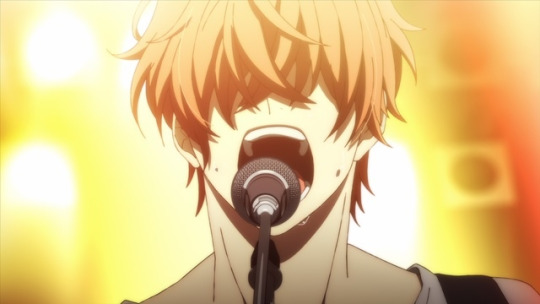
——Was there anything you felt when you actually conducted the production?
First of all, I was extremely happy that a song I made was sung. It was expressed in a way that I myself couldn’t do, and even if the emotions are the same, the way people view it changes depending on who’s singing. Seeing it hand-in-hand with the series, spreading up just like that and growing bigger made me happy.
——The other song, “Fuyu no Hanashi”, played during the show in episode nine.
From the very beginning, there was already a song titled “Fuyu no Hanashi” in the drama CD, but this song began from me creating a new “Fuyu no Hanashi”. “Fuyu no Hanashi” already existed for the fans, so I saw plenty of everyone’s love for it on Twitter and such, and also how it comes close to their daily lives. I dreaded painting over it, but... I believed it was fate that I had received this proposal, so I thought, “I’m going to do all I can”. While there was pressure, there was also joy, so it was a strange feeling.
To tell the truth, when I received the proposal for “Given”, the offer for “Fuyu no Hanashi” came first-thing. That’s why I actually started the production from there. Afterward, I received proposals for the session track that plays in the middle of the show and for the theme songs... That is how it went.
——Was that so?! The seed, the piece that would give you most pressure came first, so to say.
That’s right. But for me, this was a comfortable wall. I worked on it while thinking that, if I could make many people happy with it, then it would be a big step for me.
——What kind of feelings did you put into it?
I figured it would probably be used for the live concert scene in the middle of the show, so I read the scene and imagined the concert over and over. In the drama CD, it could only be portrayed with sounds and voices, so I think they probably gave importance to how they would insert the monologues into the lyrics. In the anime’s case, there would be an animation accompanying the song, so I reflected on what the “Fuyu no Hanashi” that I could compose was. Like a shout for a person who has been lost... It’s a requiem, but also a follow-up of one’s true intentions... I wanted to treasure those messed-up feelings. Also, I thought it was a song that had been preciously loved until then, so I had a strong sense of duty not to ruin this.
Being involved with “Given” changed his life!!
——Could you also tell us about the track “Sessions” (The Seasons) that plays during the show?
I received the proposal for this one after “Fuyu no Hanashi”. “There’s a scene in the show that goes like this, so if you’d like, couldn’t you make a track for it,” they asked.
I had never made an actual instrumental band track. Counting the fact that three pieces had already been decided for the story, it was quite a pressure on me.
When I actually watched the scene where they are performing it in the anime, my spirits went right up. Like, “So this is how the band will go”. The sensation that oozed from my hands and spread into me felt truly good.

——Lastly, Atsushi-san, could you tell us... about the things you have realized and earned through the music production of “Given”?
It’s a series that has several places where everyone can join hands. I think that is exactly why so many fans love this work.
Being involved with “Given” has changed my notions of life, and I feel that it was a huge feat, if only for my musical life. I am filled to the brim with happy feelings for being part of it.
——Thank you very much for telling us so many things today.
#given#dailygiven#givendaily#fyeahgiven#given anime#satou mafuyu#uenoyama ritsuka#nakayama haruki#kaji akihiko#centimillimental#interview#animate times#my translation
291 notes
·
View notes
Text
quality time
rwrb and the five love languages | part four
in which bea nearly crashes from the stress of party-planning (aroace rep)
Princess Beatrice buzzes around The Masquerade, double-checking place cards, straightening table settings, and pulling dried rose petals from the centerpieces. She rented the concert venue for the night to throw a modern Valentine’s gala to benefit Henry’s queer youth center in London. He and Alex are around here somewhere, probably hooking up in a broom cupboard and definitely not nitpicking every detail like Bea is. Her assistant follows her with a clipboard and updates her on the schedule: t-minus three hours until guests arrive and, in the meantime, she needs to give final approval, soundcheck with the band, and get dressed up. Jeans and a blazer, while royal casual, are not party-appropriate, and tonight needs to be perfect.
She usually hates royal events like galas, but this one is special. Not because it’s Valentine’s Day—Bea could not give two fucks about the holiday—but because ever since coming out as asexual around Christmas, she’s been looking for an opportunity to help other queer people, or at least give them a public figure they could point to and say, “See Mum and Dad, she’s like me.” Henry and Alex got their chance, and now this time, it’s hers.
The stage lights up with pink and red; it’s cheesy, but Bea digs it. The concert was the one thing she would not budge on with her royal event planner. Did she want to reach into wealthy pockets? Yes. Did she still want to have a good time? Hell yes. And the band she’s joining for one night only happens to be just as queer as the charity they’re supporting.
Permanent Record, local to London, tune their instruments on stage. Bea has met them dozens of times over the last month and vibed with them instantly. Margot, the too-cool lead singer always decked out in a leather jacket and Docs, is ace like her, and as much as Bea has wanted to get to know them, there’s been no time. Turns out, party-planning and party-executing steals the host away from all meaningful human connection. She’s only been able to keep up with Henry because he’s partly responsible for this event.
The pit, full of tables covered in pink and gold, finally looks perfect enough for Bea to hand-off any other minute fixes to the planner and finally have her soundcheck with the band. But then, a large crash comes from the back of the venue, and she hears a loud shriek coming from a familiar voice, the one that’s been shrill and disapproving for the last month. When Bea runs up, she sees hundreds of shattered champaign flutes and her planner on the floor, blood oozing from her hands.
This cannot be happening. The only reason Bea kept this woman around was to take most of the day-of duties off her plate. But she’s in the back of an ambulance now, and Henry is nowhere to be found. Bea’s stress levels go from tolerable to unbearable as she orders her assistant to track down replacement flutes. The staff are quick to fill her other requests: a couple of people start sweeping, someone runs off to find her co-host, another tells the band Bea’s soundcheck will be postponed, and a brave soul steps up as a temporary assistant and follows her around the back tables to check for broken glass. Bea knows she doesn’t have to be the one to do this, but it seems like the success of this event lies solely one her shoulders. If something goes wrongs, it’s her face—not Henry’s—in the papers the next day. Powder Princess Crashes and Burns at Gay Ball. Christ.
After an hour, everything is sorted. There’s no glass. The planner is getting stiches. Permanent Record has started their soundcheck and sound amazing. But even their chill indie tunes can’t calm the princess. She needs to get on stage, but her stylist specifically requested she have at least two hours to work his magic, which is not going to happen.
Bea tells her assistant to get her stylist and his team to the venue, because she won’t be able to leave, and warn him he’ll only have an hour at best. Henry and Alex have already taken off to get ready, and she has to remind herself to smack them later for abandoning her.
She tugs off her blazer, drapes it over a chair, and rolls up her sleeves. If she does get her hands on a guitar, she’ll explode. It’s all she can think of to stop her from raiding the bar at the back.
“Better late than never, eh, Princess?” Margot says as she huffs on stage.
One of the stagehands gives Bea her beautiful sleek, black Fender Stratocaster, and her anxiety reduces itself to a hum. Music can’t cure all, but it certainly keeps her from wrecking every good thing in her life.
“Let’s just play,” she says.
But it’s anything but perfect. Whatever chemistry she had with Permanent Record somehow jumped into the Thames between their last rehearsal and now because this is an absolute travesty and she’s only playing two songs with them tonight. She’s forgotten measures of one song and can’t find the chords fast enough in her solo of the other. Utter shit.
Why does she even fucking bother?
She always fucks everything up. Always. Why did she think she could put this on? Sure, she’s chaired these events before, but not ones she actually cares about, not ones she’s actually put her heart into. Christ, no wonder. She should’ve known it would turn out like this. She’s the anti-Midas; everything she touches turns to shit.
No kid will ever see her as a queer role model. She’s the girl they point to and say, “See Mum and Dad, what a waste.”
She needs a hit so fucking bad.
Which is why she has to get out of here ASAP. Before she does anything she’ll regret. She won’t slip again, and she won’t be the reason this gala fails. Henry can handle it without her.
So when Margot calls for a five-minute break, Bea excuses herself and hands off her guitar. On her way out the door, she tells the stagehand to find her assistant and tell her to have Henry take over. The hard part is over thanks to the planner actually being brilliant at her job, even if she and Bea would never get along.
No doubt, cameras are already lined up outside, so she hides in one of the green rooms and locks the door behind her. If she just takes a deep breath and calms down, she can bring herself back from the edge.
Five things she can see: The 1975, Arctic Monkeys, Oasis, Solange, and Fiona Apple’s signatures on the artist wall.
Four things she can feel: the worn leather on a crusty couch, the chipped-paint walls, her toes in her shoes, and her fingers through her light brown hair.
Three things she can hear: the ticking from the clock, the click of her heels as she paces, and a knock at the door.
Two things she can smell: decades-old musk from artists past—no doubt coming from the couch—and her light perfume on her wrist.
One thing she can taste: a hint of coffee from earlier.
She breathes in and out, and the knock on the door continues.
“Bea, are you in there? Could you let me in?” Margot. Essentially a stranger. She supposes it’s better than facing a disappointed Henry, so she opens the door and promptly relocks it as soon as they’re inside.
“Christ, this place is legendary, isn’t it? Everyone’s played here—is that Bob Dylan? Fucking nuts,” Margot says, pointing to the wall.
“I’ve seen loads of people here. Always wanted to play here myself,” Bea tells them. She traces Lizzo’s signature. That was a fun night; Nora and June flew out for a girls’ night, which was ultimately crashed by Pez.
“Me too, and the rest of band as well, I suppose.” Margot looks at Bea and smiles. They’re brown eyes crinkle in the corner, and it reminds her of Alex. “And now we get to, eh, Princess? Couldn’t’ve gotten here without you. The whole world knows Permanent Record now.”
“You could’ve done it without me,” she says. “You will tonight anyway.”
“Hey.” They reach for Bea’s hand. “Everyone has some hiccups before a big gig. It’ll be grand, but only if you’re there. This is your night as much as it is ours or the youth center’s. You have no idea how important it is for your lot to shine a light on causes people shy away from.”
That makes Bea smile. For so long she wanted to hide from her position. She wanted freedom to do whatever she pleased, but now she understands the power she has, even if people still see her as “The Powder Princess.” No matter what she wears, millions of fashion influencers share links to her clothes. If she walks into a restaurant, their yearly profits skyrocket. When she told the world she was ace, thousands of people messaged her and said the same. One of them was Margot, telling her about their undiscovered band from South London.
She tells Margot how that was one of the first times she really felt like herself. Completely at peace with who she is. How that peace got away from her and turned this gala into a near-panic-attack-inducing event, she doesn’t know.
“Have you let on how stressed you’ve been to anyone?” Margot asks. The two sit together on the couch after Margot bravely plopped themself down on the dirty, old thing.
“Hadn’t the time,” she says. Truthfully, Bea doesn’t think she’s had a genuine conversation with anyone since the gala’s conception.
Margot throws their hands in the air. “Well, there you go then! You’ve got to take the time! To take care of yourself. To hang out with your mates. Just to have some goddamn fun, Bea! Come on! You think I’d be a functioning human if I didn’t let loose with my mates every now and then? This—” They gesture to their body, covered in tattoos and tattered black clothing. “Doesn’t happen on its own.”
Bea laughs. It’s been so long since she’s laughed from anything other than stress. “Right, so how does this all happen then?” She swirls her hand in Margot’s direction.
As they chat, Bea relaxes. They talk about their families and uni and music and coming out. Bea tells Margot about the time she and the gang went to the karaoke bar where Henry got wasted and sang Queen horrifically. Margot tells her about the time in year twelve when they got dared to try out for the school play and ended up playing an old man in the most unbelievable bald cap.
Eventually, the two of them pull out their phones and play a few games of Among Us until Bea’s desperate assistant finds her and pleads for her to get ready though the door. They only have an hour before guests arrive.
“You all right?” Margot asks. “Want to go out there and try again?”
Funny how it doesn’t seem so scary anymore. How it only took a short break, a nice chat, and a little pink astronaut to put Bea at ease. She smiles. The notes come back to her fingertips.
check out the rest of my rwrb and the five love languages series: part one, part two, part three, and part five. (links to come as they’re released)
listen, my permanent headcanon is aroace bea and you will never convince me otherwise and i will never write her as anything else bc i love her so much!! (that being said, if you ship her with anyone, i totally understand). also, i reference a fic of mine i wrote for winterfest so if you want to check out my version of bea’s coming out, you can do that here! and finally, i know this wasn’t a romantic fic for romance week but like i said in part one, valentine’s day is different for everyone. <3
rwrb romance week | @rwrb-fests
#rwrb#princess bea#beatrice fox mountchristen windsor#my writing#rwrbromanceweek#rwrb fest#rwrb fanfic#fanfic#red white and royal blue#casey mcquiston#alex claremont diaz#henry fox mountchristen windsor#nora holleran#june claremont diaz#stick up his arse philip#president claremont#oscar diaz#rafael luna#zahra bankston#queer lit#queer books#queer authors#aroace#nonbinary#ace rep#nonbinary rep#love languages#quality time#valentines#valentines day
28 notes
·
View notes
Text
The Robins as...

DICK:
Glam rock / Heartland rock ; goes by the pseudonym “Azul”; the Artist Formerly Known as Nightsing
He’s an incredible all-around performer, so it should come as no surprise that he’s a natural frontman (or solo act).
He’s constantly reinventing his look (short, long, mullet - you name it, he’s probably sported the hairstyle). And Discowing’s got nothing on the outfits he wears onstage.
People love booking or working with him because he’s very professional (but does have a volatile temper from time to time).
The only thing that he requests for in his hotel room or trailer? A poster of The Flying Graysons. Oh, and cereal. Lots of it.
He actually uses the Cirque-du-Soleil-ish set design, blowing minds all over the world.
He likes calling audience members onto the stage, and never forgets to introduce his bandmates and give credit to those who made the concert possible.
His bodyguards don’t get paid enough for the number (and level of aggression) of fans who throw themselves at him.
He actually responds to fan mail, loves visiting sick fans in the hospitals, and gives warm hugs during meet-and-greets.
A substantial part of the proceeds from all his concerts go to the Martha Wayne Foundation, which supports many schools and orphanages.
His “entourage”? His long-term girlfriend, Kory Anders ( “Azul! Over here! Gotham Gazette! Why haven’t you proposed yet?”), and his childhood best friend, Wally West.
For all his showmanship, he’s notoriously private about his personal life. And, honestly? The spotlight does make him tired.
JASON:
Folk rock / Grunge rock ; goes by the pseudonym “Rason Rodd”
He sings and plays rhythm guitar, while Roy Harper’s on either bass or drums and Lady Artemis slays on lead guitar. Together they’re known as The Outlaws, managed by Mr. Am Not Bizarro.
He sounds so much like Eddie Vedder that it’s eerie. Eerily beautiful.
His debut solo album “I Ain’t No Joker” went straight to #1 on the world charts.
He’s found that music can be an effective political tool, so expect to find him lending his talents, free of charge, to various charities and advocacies. (On that note, he’s already done jail time for his blatantly subversive lyrics.)
He’s on the road so much that he practically lives on the tour bus (that’s always stocked with beer and cigarettes). At this point, he’s... trying not to mind. He’s been away from what he used to consider “home” for so long that he’s not sure where to go.
With The Outlaws and their connections, he holds free music workshops and provides informal foster care for Gotham’s street children, who often don’t have proper adult supervision.
During his downtime, he visits prisons in Gotham City to perform for the inmates, hoping to encourage them. Then he’ll anonymously send their low-income families some groceries every now and then.
It’s either you’ll barely recognize him on the streets because he’s so low-key or know it’s him because he’s wearing something outrageous, like a tinted gas mask or a plague doctor getup, on a grocery run.
TIM:
Rap rock / Electronic rock ; goes simply by his last name, “Drake” (not to be confused with other famous artist Drake or Gotham vigilante Drake or male fowl -- "I'm not any of them, alright!")
He’s moved on from his punk rock roots and has been experimenting with fusion subgenres.
Once in a while, he’ll do reunion performances with former bandmates Bart Allen and Cassandra Sandsmark.
Nowadays, he frequently collaborates with other artists with different musical backgrounds, such as rapper D.u.k.e. T and country crooner Conner “Kon” Kent.
He’s notoriously hardworking (and his PA’s got some toned legs from all those coffee runs).
His albums are a hit among the younger demographic, but his famous adoptive father says that he “is extremely proud of my son, but I... I don’t really understand his music.” (Hmm. Makes you wonder if billionaire Bruce Wayne’s got a closet full of Drake’s “Sedimentary / Metamorphic / Igneous - The Anthology”.)
He’s developed his own state-of-the-art software for composing music and even performs live as a hologram (through the help of information technology magnate Barbara Gordon’s company, Oracle).
He’s made the said software, which makes it possible to produce professional-quality music using little to no equipment other than a mobile phone, free and accessible so that aspiring musicians who can’t afford to work in studios can pursue their dreams.
He enjoys discovering new talent, especially among young people who haven’t had as many opportunities as he’s had, and offers to manage them for free.
His on-again-off-again relationship with pop star Stephy Brown has made him a tabloid staple.
When asked by a reporter what he likes to do for fun, he answered, “Sleep” while slowly sinking into the couch.
DAMIAN:
Heavy metal meets orchestra music (think Metallica’s “S&M”concert) ; goes by the pseudonym “Habibi”
He’s a musical prodigy who can play practically any instrument from percussion to wind, but the need for control led him to being a conductor.
Like Timothy, he likes to experiment. His latest project, which he’s very secretive to the media about, has to do with oriental influences. He’s called upon the help of his sister, a musical prodigy like him, Cassandra Cain.
He’s notoriously a perfectionist, which makes it challenging to work with him. (But no one argues that he’s a musical genius, so they put up with it.)
He owns the Wayne Conservatory of Music, which offers full educational scholarships and training programs to the poor youth in Gotham who are musically gifted.
He once told a news reporter that his greatest dream is to conduct the ultimate performance -- his obra maestra -- starring Azul, Rason Rodd, and Drake.
When he’s not busy in the studio or mentoring budding musicians, he’s just in his mahal (palace), hanging out with his best friend Jon Kent, practicing martial arts, or enjoying the company of his pets.
And in the quiet moments of their famous lives, they dial one number that always brings them back down to earth...
Alfred: *picks up* Hello? I’ve missed you, too, Master -- What’s the matter? Why are you crying? Oh, bullocks, don’t listen to what they’re saying... In which part of the world are you right no-- Ah, never mind. I’ll just follow the tracker Master Bruce has put on you. I’ll see you in a bit.
~ * ~ * ~ * ~ * ~
For you, @xellexavierxau.
#the robins as#incorrect batfamily quotes#bruce wayne#dick grayson#jason todd#tim drake#damian wayne#barbara gordon#cassandra cain#duke thomas#alfred pennyworth#koriand'r#roy harper#bizarro#artemis of bana-mighdall#conner kent#bart allen#cassandra sandsmark#jon kent#appreciation post#mine#tumblr: xellexavierzau#big brother of the year#caffeinated crusader#grumpy old kid#hug monster
434 notes
·
View notes
Text
David Byrne’s interview in NME magazine
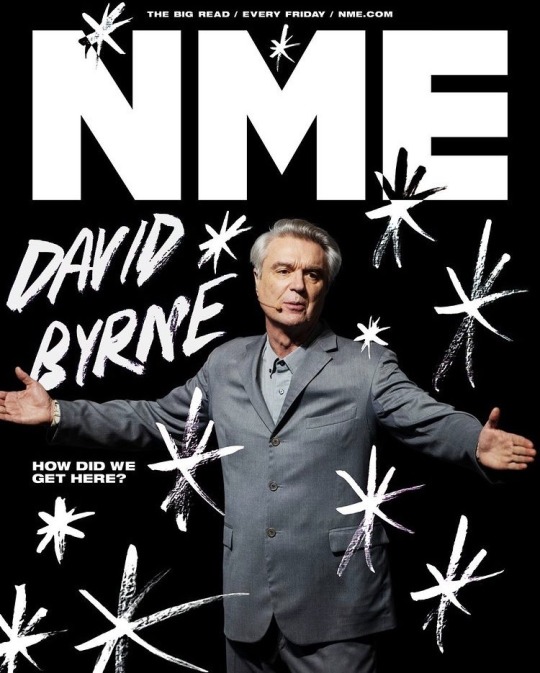
In 1979, David Byrne predicted Netflix. “It’ll be as easy to hook your computer up to a central television bank as it is to get the week’s groceries,” he told NME’s Max Bell, sitting in a Paris hotel considering the implications of Talking Heads’ dystopian single ‘Life During Wartime’.
He predicted the Apple Watch in that interview too: “[People will] be surrounded by computers the size of wrist watches.” And he foresaw surveillance culture and data harvesting: “Government surveillance becomes inevitable because there’s this dilemma when you have an increase in information storage. A lot of it is for your convenience, but as more information gets on file, it’s bound to be misused.”
In fact, over 40 years ago, he predicted the entire modern-day experience, as if he instinctively knew what was coming. “We’ll be cushioned by amazing technological development,” he said, “but sitting on Salvation Army furniture.”
The 68-year-old Byrne says today, “You can’t say that you know,” chuckling down a Zoom link from his home in New York and belying his reputation for awkwardness by seeming giddily relieved to be talking to someone. “It’s crazy to set yourself up as some sort of prophet. But there’s plenty of people who have done well with books where they claim to predict what’s going on. I suppose sometimes it’s possible to let yourself imagine, ‘Okay – what if?’ This can evolve into something that exists, can evolve into something more substantial, cheaper – these kinds of things.”
It’s been a lifelong gift. Byrne turned up at CBGBs in 1975 with his art school band Talking Heads touting ‘Psycho Killer’, as if predicting the punk scene’s angular melodic evolution, new wave, before punk was even called punk. In 1980, Talking Heads assimilated African beats and textures into their seminal ‘Remain In Light’ album, foreshadowing ‘world music’ and modern music’s globalist melting pot, then used it to warn America of the dangers of consumerism, selfishness and the collapse of civilisation. Pioneering or propheteering, Byrne has been on the front-line of musical evolution for 45 years, collaborating with fellow visionaries from Brian Eno to St Vincent’s Annie Clark, constantly imagining, ‘What if?’
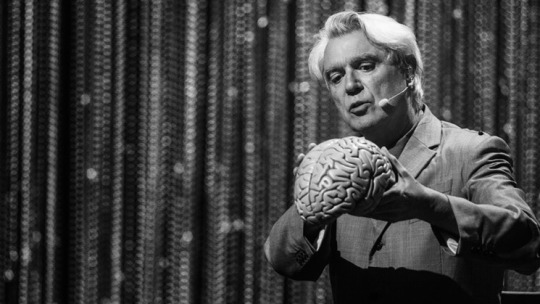
The live music lockdown has been a frustrating freeze frame, but Byrne was already leading the way into music’s new normal. Launched in 2018, the tour to support his 10th solo album, ‘American Utopia’, has now turned into a cinematic marvel courtesy of Spike Lee – the concert film was released in the UK this week. The original tour was acclaimed as a live music revolution. Using remote technology, Byrne was able to remove all of the traditional equipment clutter from the stage and allow his musicians and dancers, in uniform grey suits and barefoot, to roam around a stage lined with curtains of metal chains with their instruments strapped to them. A Marshally distanced gig, if you will.
“As the show was conceptually coming together, I realised that once we had a completely empty stage the rulebook has now been thrown out,” Byrne says. “Now we can go anywhere and do anything. This is completely liberating. It means that people like drummers, for example, who are usually relegated to the back shadows, can now come to the front – all those kinds of things – which changes the whole dynamic.”
With six performers making up an entire drum kit and Byrne meandering through the choreography trying to navigate a nonsensical world, the show was his most striking and original since he jerked and jived around a constructed-mid-gig band set-up in Jonathan Demme’s legendary 1984 Talking Heads live film Stop Making Sense.
The American Utopia show embarked on a Broadway run last year, where Byrne super-fan Spike Lee saw it twice and leapt at the chance of turning the spectacle into Byrne’s second revolutionary live film, dotted with his musings on the human condition to illuminate the crux of the songs: institutional racism, our lack of modern connection, the erosion of democracy and, on opener ‘Here’, a lecture-like tour of the human brain, Byrne holding aloft a scale model, trying to fathom, ‘How do I work this?’
“I didn’t know how much of a fan Spike was!” Byrne laughs today. “He’d even go, ‘Why don’t you do this song? Why don’t you add this song in’. We knew one another casually so I could text him and say, ‘I want you to come and see our show; I think that you might be interested in making a film of it’.”
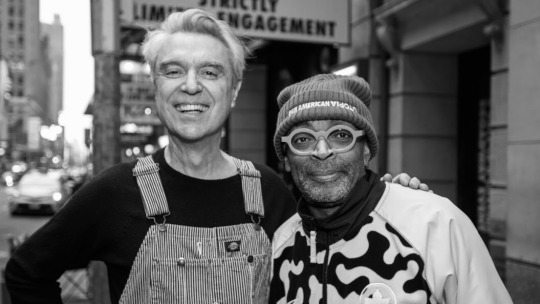
Are the days of the traditional stage set-up numbered? “Yes, I think so,” he replies. “At least in theatres and concert halls the size that I would normally play, yes. The fact that we can get the music digitally [means] a performance has to be really of value. It has to be really something special, because that’s where the performers are getting their money and that’s what the audience is paying for. They’re not paying very much for streaming music, but they are paying quite a bit to go and see a performance, so the performance has to give them value for money… It has to be really something to see.”
How does David Byrne envisage the future possibilities of live performance?
“I’ve seen a lot of things that hip-hop artists have done – like the Kanye West show where he emerges on a platform that floats above the stage,” he says. “I’d seen one with Kendrick Lamar where it was pretty much just him on stage, an empty stage with just him on stage and a DJ, somebody with a laptop – that was it. I thought, ‘Wow’. Then he started doing things with huge projections behind. There are lots of ways to do this. I love the idea of working with a band, with live musicians. ‘How can I innovate in this kind of way?’ It’s maybe easier for a hip-hop musician who doesn’t have a band to figure out. The pressure is on to come up with new ways of doing this.”
In liberating his musicians from fixed, immovable positions, American Utopia also acts as a metaphor for freeing our minds from our own ingrained ways of thinking. As Byrne intersperses Talking Heads classics such as ‘Once In A Lifetime’, ‘I Zimbra’ and ‘Road To Nowhere’ with choice solo cuts and tracks from ‘American Utopia’, he also dots the show with musings on an array of post-millennial questions: the health of democracy; the rise of xenophobia and fascism; our increasing reliance on materialism and online communication; the climate change threat; the existential nightmare of the dating app; and, crucially, the distances all of these things put between us.
“The ‘likes’ and friends and connections and everything that the internet enables,” he argues, “even Zoom calls like this, they’re no substitute for really being with other people. Calling social networks ‘social’ is a bit of an exaggeration.”
Byrne closes the show with the suggestion that, rather than isolate behind our LCD barriers, we should try to reconnect with each other. In an age when social media has descended into all-out thought war and anyone can find concocted ‘facts’ to support anything they want to believe, is that realistic?
“I have a little bit of hope,” he says. “Not every day, but some days. I have hope that people will abandon a lot of social media, that they’ll realise how intentionally addictive it is, and they’re actually being used, and that they might enjoy actually being with other people rather than just constantly scrolling through their phone. So, I’m a little bit optimistic that people will, in some ways, use this technology a little bit less than they have.”
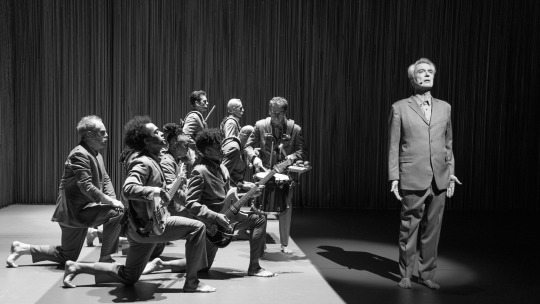
A key moment in American Utopia comes with Byrne’s cover of Janelle Monae’s ‘Hell You Talmbout’, a confrontational track shouting the names of African-Americans who have been killed by police or in racially motivated attacks – Eric Garner, Trayvon Martin, George Floyd and far, far too many more. Does Byrne think the civil unrest in the wake of Floyd’s death and the rise of the Black Lives Matter movement make a serious impact?
“We’ll see how long this continues,” he says, “but in projects that I’m working on – there’s a theatre project I’m working on in Denver, there’s the idea of bringing this show back to Broadway, there’s other projects – those issues came to the fore. Issues of diversity and inclusion and things like that, which were always there. Now they’re being taken more seriously. The producers and theatre owners realise that they can’t push those things aside, that they have to be included in the whole structure of how a show gets put together.”
“At least for now, that seems to be a big change. I see it in TV shows and other areas too. There’s a lot of tokenism, but there’s a lot of real opportunity and changed thinking as well.”
Elsewhere, he encourages his audience to register to vote, and had registration booths at the shows. He must have been pleased about the record turnout in the recent US election? “Yeah, the turnout was great. Now you just got to keep doing that. Gotta keep doing it at all the local elections, too. It was important for me not to endorse a political party or anything in the show but to say, ‘Listen, we can’t have a democracy if you don’t vote. You have to get out there and let your voice be heard and there’s lots of people trying to block it.’ We have to at least try.”
Will Trump’s loss help bring people together after four years with such a divisive influence in charge?
“Yes. I think for me Trump was not so much a shock; we knew who he is. He was around New York before that, in the reality show [The Apprentice], we knew what kind of character he was. What shocked me was how quickly the Republican party all fell into line behind him, behind this guy who’s obviously a racist, misogynist liar and everything else. But it’s kind of encouraging – although it’s taken four years and with some it’s only with the prospect of him being gone – that quite a few have been breaking ranks. There are some possibilities of bridge building being held out.”
But, he says, “It’s too early to celebrate,” concerned that Senate Majority Leader and fairweather Trump loyalist Mitch McConnell will use any Republican control of the Senate to block many of Biden’s policies from coming into effect. “[This] is what happened with Obama… I want to see real change happen. [Climate change] absolutely needs to be a priority. The clock had turned back over the last four years, so there’s a lot to be done. Whether there’s the willpower to do everything that needs to be done, it remains to be seen, but at least now it’s pointing in the right direction.”
How will he look back on the last four years? Byrne ponders. “I’m hoping that I look back at it as a near-miss.”
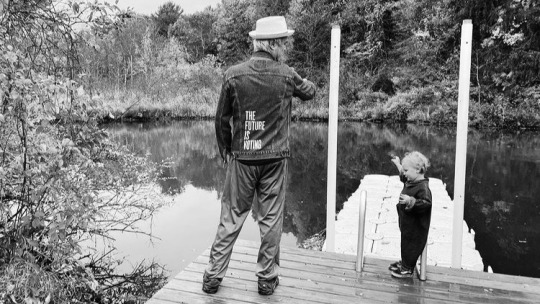
American Utopia is as much a personal journey as a dissection of modern ills. Ahead of ‘Everybody’s Coming To My House’, Byrne admits to being a rather socially awkward type. He claims that a choir of Detroit teenagers, when singing the song for the accompanying video, had imbued the song with a far more welcoming message than his own rendition, which found him wracked with the fear that his visitors might never leave. How does someone like that deal with celebrity?
“In a certain way it’s a blessing,” Byrne grins, “because I don’t have to go up to people to talk to them – they sometimes come up to me. In other ways it’s a little bit awkward. Celebrity itself seems very superficial and I have to constantly remind myself that your character, your behaviour and the work that you do is what’s important – not how well known you are, not this thing of celebrity. I learned early on it’s pretty easy to get carried away. But it does have its advantages. I had Spike Lee’s phone number, so I could text him.”
Talking Heads drummer Chris Frantz’s recent book Remain In Love suggests that the more successful Byrne got early on, the more distant he became.
Byrne nods. “I haven’t read the book, but I know that as we became more successful I definitely used some of that to be able to work on other projects. I worked on a dance score with [American choreographer] Twyla Tharp and I worked on a theatre piece with [director] Robert Wilson – other kinds of things – [and] I started working on directing some of the band’s music videos. So I guess I spent less time just hanging out. As often happens with bands, you start off being all best friends and doing everything together and after a while that gets to be a bit much. Everybody develops their own friends and it’s like, ‘I have my own friends too’. Everybody starts to have their own lives.”
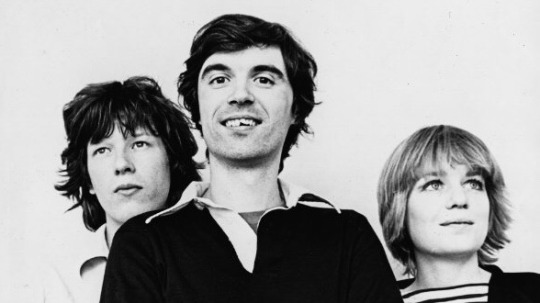
The future is far too enticing for David Byrne to consider revisiting the past. “I do live alone so sometimes it would get lonely”, he says of lockdown, but he’s been using his Covid downtime to cycle around undiscovered areas of New York and remain philosophical about the aftermath.
“We’ll see how long before the vaccine is in, before we return to being able to socialise,” he says, “but I’m also wondering, ‘How am I going to look at this year? Am I going to look at it as, “Oh yes, that’s the year that was to some extent taken away from our lives; our lives were put on pause?”’ We kept growing; we kept ageing; we keep eating, but it was almost like this barrier had been put up. It has been a period where, in a good way, it’s led us to question a lot of what we do. You get up in the morning and go, ‘Why am I doing this? What am I doing this for? What’s this about?’ Everything is questioned.”
Post-vaccine, he hopes to “travel a little bit” before looking into plans to bring the ‘American Utopia’ show back to Broadway, and possibly even to London if the financial aspects can be worked out. “Often when a show like that travels, the lead actors might travel,” Byrne explains, “but in this case it’s the entire cast that has to travel. So you’ve got a lot of hotel bills and all that kind of stuff. We wanted to do it. There might be a way, if we can figure that out.”
Once we all get our jab, will everyone come to recognise that, as Byrne sings on ‘American Utopia’s most inspiring track, ‘Every Day Is A Miracle’? “Optimistically, maybe,” he says. “There will be a lot of people who will just go, ‘Let’s get back to normal – get out to the bars, the clubs and discos’. That’s already been happening in New York; there’s been these underground parties where people just can’t help themselves. But after all this it’d be nice to think that people might reassess things a little bit.”
And with the algorithm as the new gatekeeper and technology beginning to subsume the sounds and consumption of music, what does the new wave Nostradamus foresee for rock in the coming decades? Will AIs soon be writing songs for other AIs to consume to inflate the numbers, cutting humanity out of the equation altogether?
“It seems like there’ll be a kind of factory,” Byrne predicts, “an AI factory of things like that, and of newspaper articles and all of this kind of stuff, and it will just exaggerate and duplicate human biases and weaknesses and stupidity. On the other hand, I was part of a panel a while back, and a guy told a story about how his listening habits were Afrofuturism and ambient music – those were his two favourite ways to go. The algorithm tried to find commonalities between the two so it could recommend things to him and he said it was hopeless. Everything it recommended was just horrible because it tried to find commonalities between these two very separate things. This just shows that we’re a little more eclectic than these machines would like to think.”
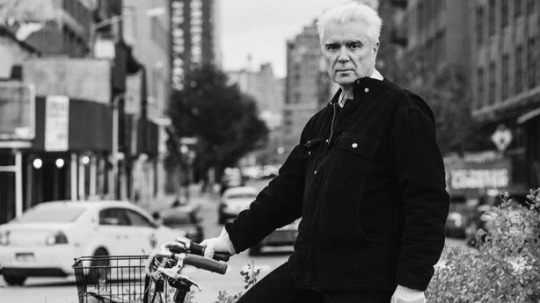
And in the distant future? Best prepare to welcome your new gloop overlords. Byrne isn’t concerned about The Singularity – the point at which machine intelligence supersedes ours and AI becomes God – but instead believes that future technologies will emulate microbial forms.
“I watched a documentary on slime moulds [a simple slimy organism] the other day,” he says, warming to his sticky theme. “Slime moulds are actually extremely intelligent for being a single-celled organism. They can build networks and bunches of them can communicate. They can learn, they have memories, they can do all these kinds of things that you wouldn’t expect a single-celled organism to be able to do.”
“I started thinking, ‘Well, is there a lesson there for AI and machine learning, of how all these emerging properties could be done with something as simple as a single cell?’ It’s all in there… when things interact, they become greater than the sum of their parts. I thought, okay, maybe the future of AI is not in imitating human brains, but imitating these other kinds of networks, these other kinds of intelligences. Forget about imitating human intelligence – there’s other kinds of intelligence out there, and that might be more fruitful. But I don’t know where that leads.”
His grin says he does know, that he has a vision of our icky soup-world future, but maybe the rest of the species isn’t yet advanced enough to handle it. But if we’re evolving towards disaster rather than utopia, we can trust David Byrne to give us plenty of warning.
December 18, 2020
#david byrne#talking heads#music#new wave#post-punk#art pop#avant funk#worldbeat#interview#nme magazine#2020
50 notes
·
View notes
Video
youtube
Here’s something I know you’ve heard before--Dare, by the Human League! One of the most famous and widely-acclaimed synth-pop albums there is, Dare was a huge game changer. Find out why by watching my video, or reading the transcript, after the break.
Welcome to Passionate Reply, and welcome to Great Albums! Today, I’m going to be talking about one of the single most important albums in the history of electronic music, and, perhaps, in Western popular music as a whole. It’s Dare, the third full LP from the Human League, first released in 1981. While there had been two albums released under this name prior to Dare, these are considerably more obscure.
Music: “Empire State Human”
While “Empire State Human” has a catchy and affable chorus, it’s still a few shades too weird and avant-garde to be a pop hit. In the early days, the Human League’s experimental, underground sound was driven mainly by founding members Martyn Ware and Ian Craig Marsh. Prior to the recording of Dare, Marsh and Ware had already left the group, and would go on to form Heaven 17. Frontman Phil Oakey, and newly hired backup singers Joanne Catherall and Susan Ann Sulley, were without a leg to stand on, as none of them had any serious background in music composition or playing instruments.
While the situation looked quite dire, the trio would find a new musical bedrock in Ian Burden, who had played keyboards on their most recent tour as a session musician. Against the crude, naive, unprofessional vocals of Oakey, Catherall, and Sulley, Burden would provide simple, but competent melodies. The other key ingredient of this new sound was professional production, which would come from Martin Rushent. Despite working with many guitar-oriented acts prior, Rushent was one of the first producers who had deliberately devoted himself to working with electronic instruments at the time. Put all of that together, and you’ve got synth-pop magic, like nobody else had hammered out before.
Music: “Don’t You Want Me”
If you came to this video with even a lick of knowledge about Western pop, then you probably know “Don’t You Want Me” quite well. “Don’t You Want Me” wasn’t the first electronic pop song, nor was it the first major hit to feature a chiefly electronic instrumentation. The real reason it was such a game changer is that it’s ultimately a very ordinary pop song, underneath all of that. Songs like Gary Numan’s “Cars,” or OMD’s “Enola Gay,” were comparatively easy to write off as mere high-concept novelty. Many felt that their vision of a future full of machine music would blow over, the way jetpacks and flying cars had failed to revolutionize the world. But “Don’t You Want Me” proved that you could write an otherwise unremarkable love song, set it to a fairly unambitious synth backing, and achieve major pop success. “Don’t You Want Me” is that watershed moment, where synthesisers start presenting a credible threat to guitars, and everything that they stand for. Moreso than anything else that was released in this era, “Don’t You Want Me” is the reason why “pop” is, at this point, assumed to be electronic by default.
While the sheer influence of this track can’t be overstated, it’s also far from the only thing Dare, as an album, has to offer. In fact, “Don’t You Want Me” is the very last track on it, and its apparent simplicity is heavily contextualized by everything that comes before it. Take “Love Action,” for instance, which was the first single from the album, and one of the band’s best-known tracks.
Music: “Love Action”
“Love Action” is certainly not devoid of pop sensibility, and its being a chart hit makes plenty of sense. But I think it’s decidedly stranger and less conventional than “Don’t You Want Me,” with its piercing intro and glitchy synth effects. While its lyrics aren’t challenging, in an obtrusive manner, they seem to read as a sort of parody of a pop song, declaiming the superiority of limerence or casual affairs--“no talking, just looking.” It’s a pop anthem that’s aware of its own disposability, and the sort of culture of disposability and frivolousness that it’s participating in. Another strikingly ironic number is the album’s opener, “The Things That Dreams Are Made Of.”
Music: “The Things That Dreams Are Made Of”
With its confident proclamations about what “everybody needs,” and unquestioning praise of petty luxuries like ice cream and vacations, the saccharine “The Things That Dreams Are Made Of” is even more pointedly satirical, a wan hymn to the pleasures of postwar prosperity. But even if this track maintains a surface level “believability,” there are still a number of darker tracks to be had on Dare, which more strongly recall the style of those earlier albums. Take a listen to “Do or Die.”
Music: “Do or Die”
One of the more confrontational or frustrated tracks on Dare, “Do or Die” still maintains something of a pop core, and it’s easy enough to sing along to. What I think really stands out about it, though, especially for the time, is the use of mechanical percussion. Prior to this point, acts like Gary Numan, OMD, and even Kraftwerk still had human drummers who physically hit things in their bands. Even Giorgio Moroder’s “I Feel Love” used traditional percussion, despite featuring nothing but Moog synthesisers and the human voice besides. It wasn’t only the guitar that feared for its relevance during this time, but also the drum kit. The dense, rattling backing of “Do or Die” was made with a Linn “drum computer,” and remains an impressive use of it that’s still mesmerizing to listen to. But perhaps the most avant-garde track to be found on *Dare* is “Seconds.”
Music: “Seconds”
While “Seconds” feels sort of warm and dreamy at first, its startling gunshot casts doubt on just how pleasant we ought to feel. “Seconds” is actually telling the story of the assassination of John F. Kennedy, addressing us listeners as though we embody the infamous gunman, Lee Harvey Oswald. The titular “seconds” apply to the brief moments of apparent happiness and security we feel before something goes wrong, and those narrow margins of time during which everything in our lives can change in an instant. While it’s significantly shorter, I can’t help but think it recalls the high-concept narrative tracks done by the earlier incarnation of the Human League, such as “Zero As a Limit.”
Dare’s iconic cover, a powerful symbol of 80s synth-pop to this day, was inspired by fashion magazines such as *Vogue.* While the design would crib the title, the typeface, and the face-focused composition from a 1979 cover of UK *Vogue,* the stark, bare white frame that surrounds this close-cropped headshot of Oakey is a major distinction. Floating in this sterile bath of emptiness, and borderline anonymized, it feels like the interchangeable mask of someone living out a mechanized and mass-produced existence. It’s an image that almost plays into how detractors of electronic music have decried its seemingly emotionless, inhuman ambiance, and it rides that enmity with a deliberate, defiant dignity. It says, we are what you think we are, and we’re damn proud of it. Much like the bold and brash title implies, the cover of *Dare* is a provocation, perhaps even a threat. While the cover isn’t particularly beautiful to me, as many others are, I think its austere ugliness is deeply purposeful, and that’s something I’m compelled to admire.
Despite the breakthrough success of Dare, the Human League’s 1984 follow-up, Hysteria, was a relative flop, plagued by troubled recording sessions and a lack of consistent vision for the band and their sound. Its lead single, “The Lebanon,” would achieve modest success, and its use of rock guitar and surprisingly topical lyrics make it feel very different than what you’ll find on Dare.
Music: “The Lebanon”
Though they would eventually go on to have one last major hit, in 1986’s “Human,” the Human League never developed mainstream staying power, and their core trio’s reliance on outside writers and producers left them without a firm artistic identity to fall back on. They’re still around today, performing concerts that revisit their best-known work from the past, but they never recreated the fruitful environment and industry connections that made Dare possible. Still, it’s safe to say that Dare is an inescapable presence in the history of electronic pop, looming over all subsequent works like some inscrutable Sphinx, a lightning in a bottle success whose influence remains all around us.
My favourite song on Dare is “Darkness.” As the title implies, it’s one of the more dreary, gothic numbers you’ll encounter on the album, narrating the harrowing, paranoid mindstate of an insomniac. I don’t particularly struggle with sleep, but I do have a habit of being awake all night and sleeping all day, so I love nighttime-themed songs. Plus, the lyrics of this song make reference to “seeing sounds” and “hearing colours,” a phenomenon called synesthesia. I’m not sure if anyone in the Human League really experiences this, but I do--which is part of why I’m so strongly interested in music. But enough about me! That’s all for today, thanks for listening!
Music: “Darkness”
#music#great albums#album review#album reviews#human league#the human league#synthpop#synth-pop#synth pop
16 notes
·
View notes
Note
Would it be appropriate for me to be That Dumb Bitch™ and ask for all of the music asks? Because I know I'm gonna ask them all on Anon anyway and I really love your opinions,thoughts, and suggestions on music
Thank you so much💜 ily(platonically)
And I hope you're drinking water
ILY too anon
We both know I’m drinking Diet Cokes rather than water. But I appreciate it! And of course you can be That Dumb Bitch. I approve of all Dumb Bitches as I am one too. all 30 questions coming right up!
your favorite album opener I know it’s pretty basic to answer Arctic Monkeys is a good band, but I am pretty basic so here we are. AM is a near perfect album, which is not news to anyone, but few people know that Do I Wanna Know? is the first track on the album. Masterful.
a song starting w/ the same first letter of your first name Cheat, by Emily Burns. It’s just a quiet, competent, earworm. And it’s a pretty nice message too- if it were me I wouldn’t have cheated, end of. I like it.
a song outside of your usual genre I’m not super into Metal. That’s not to say that I don’t enjoy it, my brother pretty much exclusively listens to hard rock and metal and such, so I have some stuff I like. But it’s just one of those genres someone has to introduce me to songs in. That said, I really like Cold Water by Protest The Hero. Good stuff!
a song that reminds you of your favorite season Almost Lover by A Fine Frenzy is SUCH a Fall song, I swear.
a song from a lifelong favorite artist I think my lifelong favorite artist is Ms. Lauryn Hill, if we’re going by the artists I’ve loved longest- that’s obviously influenced by my mother, who LOVES Jill Scott, Lauryn Hill, etc. I’m going with a Fugees song, not an independent, but it’s still fantastic- the classic “Killing Me Softly With His Song”.
your current “on repeat” song Montero by Lil Nas X is still on repeat and I’m not ashamed.
a song your friend introduced you to that you ended up loving Shout out Anna for introducing me ti Leikeli47! Girl Blunt was the song and now I just love her in general but Girl Blunt is good. I think my fave is Wash and Set though, so have a freebie on me.
a song that speaks the words you couldn’t say I have a hard time asking for things for myself so Rose’s Turn has always been a song I think but don’t say out loud. Starting now it’s gonna be my turn? Too unrealistic tbh.
a song that captures your aesthetic (can be ideal!) Bambi by Hippo Campus
a song about the place where you live I have played Welcome to DC so many fucking times (By Mambo Sauce because this city is a fucking joke) and I am thoroughly sick of it. When youth hockey teams use a song as their warmup song it gets old REAL fast.
a song from an international artist I LOOOOVE Maluma, sorry not sorry, and El Perdedor is one of my favorite songs of all time tbh.
a song you can scream all the words to Love In The Morning by Chris Jobe. I just really enjoy the song idk why. Also it’s a very simple song and it’s easy to sing.
a reboot of a song/songs you already loved (remix, mashup, acoustic, etc.) I love Passionfruit, but Drake is a... problematic artist to enjoy nowadays. Yaeji did a very slow, lilting, quiet cover of it that I quite like. So now for my Passionfruit fix I support a small artist and not, you know, Drake
a song with the name of a place in the title Oh god. Vienna is literally the name of like 4 songs that I love (The Fray, Billy Joel, Lambert, and Ultravox, so I’ve gotta go with that one tbh. Lambert is instrumental and Ultravox is some chill ass 80′s stuff, and everyone knows the Billy Joel one.
a song that reminds you of traveling Feel It Still by Portugal the Man reminds me of a trip I took to NYC because someone I went with loved the band.
your favorite childhood song My favorite childhood song is What Kind of Pokemon Are You? From the 2.B.A. Master album for pokemon. It is my fave because that cd is the first piece of music I ever bought for myself.
a song that reminds you of a good time Midnight by Caravan Palace. I have seen Caravan Palace three times live, more than anyone but Betty Who, and I ALWAYS have a fantastic time at their concerts. Just. So good.
a song that reminds you of a bad time Season 2 Episode 3 by Glass Animals is how I describe depression to people- it’s not just that I’m like, blank or sad or bland. It’s that I go through the motions and it doesn’t feel like anything. I do things I love and it feels like nothing. You kind of just can’t do anything to get out of it, your stuff just stops working.
a song from an artist whose old music you enjoy more than their new music So it turns out that my favorite album by FAR for OkGo is Of The Blue Color Of The Sky, a fairly old album of theirs. I like most of thier stuff and obviously all of their videos are great, but my favorite song of theirs is from this album- Needing/Getting.
a song that empowers you I like other Lady Gaga songs more but Donatella makes me feel like I can punch through Concrete idk why
a song from a local artist DID YOU KNOW GINUWINE IS FROM DC. ANYWAYS STREAM PONY
a song you related to in the past and present, but for different reasons Let’s Dance To Joy Division by The Wombats is a song I’ve always related to. Back in the day it was just loud and fun and very good, and now I really think the message of “Everything sucks but we’re gonna celebrate what we can” is something I try to absorb as much as possible now.
your favorite cheesy pop song Classic by MKTO is an objectively bad song that I constantly have in my Spotify Wrapped. I legit can’t explain it. Is it good? no. Is it original? Also no. Is it interesting? No! I don’t get it but I’m under the spell
a song from a soundtrack (musical, movie, video game, etc.) A PROMISE FROM FIRE EMBLEM: THREE HOUSES WAS MY NUMBER THREE SONG ON MY SPOTIFY WRAPPED LAST YEAR SORRY MOM SORRY GOD
the song currently stuck in your head OR the song you are listening to right now My music is on shuffle but it just hit Hot Girl Bummer by Blackbear
a song that taught you a lesson Which to Bury, Us Or The Hatchet by Reliant K is one of my favorite songs and really is an object lesson in letting things go. What’s more important? The person or the problem? And sometimes it’s the person, so you bury the hatchet, and sometimes it’s the problem, and you bury us (the relationship). It’s a good song imo.
an instrumental song Teleblister by Clever Girl
a song you always skipped, but ended up loving once you listened to it My favorite song from The Blessed Unrest by Sara Bareilles is Cassiopeia and I straight up skipped it every time I listened for the first like, 6 months I listened to the album.
your favorite album closer good kid, m.A.A.d city is a perfect album as well, and Compton is the last song on the album. Perfection.
your all-time favorite song Such a hard question, and not always easy to answer to be honest. It fluctuates. But for me I think my all time favorite song is currently
6 notes
·
View notes
Text
DAY6: ‘We’ve Always Wanted to Go to India’
The South Korean rock band open about their songwriting process, their aspirations for future records, the definition of authenticity in a world that often dismisses artistry in K-pop and India
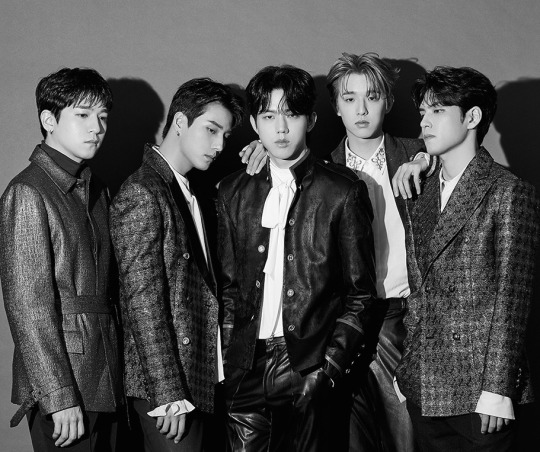
I caught up with DAY6 a few months ago via Skype–I’m told the quintet are in the middle of shooting new content for their fans and are dressed in their looks for a video, so it has to be an audio call. I can’t see them and they can’t see me, so of course there’s a lot of giggling, whispering, and moments of ominous silence that then have us all breaking into laughter together. It’s awkward, hilarious and everything you’d imagine a call with DAY6 to be.
It’s towards the end of the year so there’s a lot going on in the band’s schedule, but they’re an unstoppable force, flying across the globe to complete performances in the U.S. and in Australia. It’s a pretty rare thing to have all five members be able to join in on a single call, so I’m happy to hear all their voices greet me. “We’ve just been on tour and we’re having a good tour so far,” says vocalist and guitarist Jae. “Everyone’s been really welcoming in their countries and really just turning up for us, so we’re happy.”
DAY6 debuted in September 2015 with leader and guitarist Sungjin, bassist Young K, guitarist Jae, keyboardist Wonpil and drummer Dowoon. All members are trained vocalists, with Young K also doubling as main rapper, and every member contributes to songwriting and production. (The group did have a sixth member, a keyboardist named Junhyeok, but he left in 2016.) Young K also leads the songwriting process, with lyrical contribution in every single track on most of DAY6’s albums.
The beauty of DAY6’s artistry lies in how versatile they are able to make each track within a single album–in one moment you’re listening to a stadium anthem that’s reminiscent of a young U2, and in the next there’s a segue into Killers-esque post-punk revival. If you’ve been a long-time fan, you probably already know this thanks to their genius ‘Every DAY6’ project through 2017, which saw the band release two songs on the sixth day of almost every month. The result? An expansive, experimentative discography which built two powerful albums– Sunrise and Moonrise–with B-sides that shine just as much as a lead single. Jae explains that there usually isn’t a set idea when they begin an album–a lot of the music is born through songwriting sessions with various producers, where each member gets to go explore any genre they want on their own. It’s a power they’re exercising more and more, especially all through the Book of Us series. “We didn’t really discuss a direction when we started,” Jae says. “Everyone just kind of did what we wanted, which is why the album is a jumble of this and that from everywhere.” In fact songs have a tendency to switch genres in between verses–a great example of this is DAY6’s 2017 single “I Wait.”
The group also credit the genius of JYP Entertainment producer Hong Jisang as a key factor in their creative process. “I think definitely one of our main influences is probably gonna be one of our main producers and that’s Hong Jisang,” says Jae when I ask the band about their musical influences. “He’s a writer that works with us very frequently. For most of our title tracks–actually all of them I think so far. But yeah, he’s definitely one of the main influences because he’s always been kind of our mentor since the beginning of our debut dates… even before that. So he’s been teaching us about songwriting, you know, tracking or melody writing. We have a little bit of a flow just because we’ve grown so close to him as a group.”
“Just one of the reasons why we try any kind of genre or any music is because people do have different tastes in music,” explains Young K. “So if they like at least one of them, then it’s a success for us. Another reason is because we do get to play almost all of them, almost all [their songs] at the concert. So, we do have a chance to show it to the MyDays and the crowd and you get a chance to have fun with it. And I guess it’s just what we aim for as a group.” They’ve stood strong and stuck to their guns when it comes to this process of songwriting and it’s the fuel that expands their creative process, ensuring they don’t stick to one particular sound or vibe.
I remember back in 2016 when DAY6 began to get more popular, a lot of the attention around them was built of curiosity. As the first band under JYP Entertainment and the one of the first in the third generation of K-pop, both fans and industry professionals were curious to see where the Hallyu Wave would take them. The idea of an ‘idol rock band’ was new to the thousands of fans who had discovered K-pop after the 2016 boom of the genre, and DAY6 didn’t fit any existing stereotype–idol or band. They still don’t, and it’s a powerful statement.
This particular artistic evolution that we’ve seen with DAY6 isn’t easy to achieve in the K-pop idol-sphere of it all; our discussion about artistry in the glittering world of idol culture brings us to the topic of what it’s like to exist as what people believe to be a ‘traditional’ band in the middle of the ‘boy band narrative.’ I ask because it’s something I see often even in India–there’s this idea of authenticity always being tied to the more ‘conventional’ format of a band: artists with their instruments are deemed more ‘legit’ than pop acts. There is an unfortunate tendency among the general public to dismiss artistry created by pop stars and K-pop idols. DAY6 walk the line between the two worlds, and their path to finding that balance often demands a seesaw from one side to another. Have they ever faced a dismissal of their artistry because they’re idols who are also a band?
“That’s a very deep question,” says Sungjin. There’s a long pause as he gathers his words and then continues, “I personally haven’t seen that big of a difference. We, as a team that emphasizes on writing songs and writing music to appeal to other people, feel that everyone who writes songs or does music has the same objective and goal, therefore [artistry] is the same thing [for every musician.] So we’re not trying to focus on those kinds of factors but just try to focus instead on our music and our creation process so that we could become more authentic artists that appeal to more people.”
And what is DAY6’s definition of authenticity?
“When the person who’s creating the music legitimately feels like it’s good music,” says Sungjin firmly.
Right now the authenticity in their songwriting comes from the ordinary. Lead lyricist Young K explains the members draw from everyday experiences and conversations to write songs that are relatable, raw and honest. “Lyrics wise, I could say, we got very cleaned up and very neat. During the times of Every DAY6 project, we were out of time all the time throughout the year,” he says with a laugh. “So, it gave me the lesson of like, always being prepared to write lyrics so that I could pick out a way to find motivation or inspiration. I don’t wait for that inspiration, I gotta always go look for it. For example during everyday conversation, if there’s something or if there’s a word if there’s a phrase that I like, I write it down on my phone.” He pauses for a moment and then sheepishly admits, “To be really honest, I haven’t been doing that for months now. I need to get back on it.” He also says rather than listening to new music, skimming through lyrics is always his go-to move when it comes to evolving his style of storytelling. “So I guess it’s just continuous experiences that helped me to grow and, like you said, evolve.”
I ask the band which of their songs they would recommend to a new listener to help them understand DAY6’s artistry, and there’s a collective hum as they contemplate. “That’s a really difficult question,” says Wonpil. “Maybe ‘You Were Beautiful?’” The rest of the band agree wholeheartedly, and feel the 2017 rock ballad does a great job of summing up who DAY6 are. It’s certainly a fantastic example of the band’s powerful songwriting and their uncanny ability to to delve into topics that are at times a little too real, a little too familiar.
DAY6’s complex Book of Us series of albums have dealt mainly with the various levels of human interactions, emotions and relationships, each volume diving deeper into the complexities of what makes us who we are. The ‘Us’ in the titles can refer to DAY6 themselves, the relationship between them and their fandom MyDay as well as various other relationships the members might have in their lives. It’s also a general reference to the relationships we as human beings cultivate in our lives. The first album in the series The Book of Us: Gravity was one of their brightest releases, exploring youth and young love. The Book of Us: Entropy was a little heavier, a little more mature, exploring the beginning and end of relationships and how it changes a person.
The band’s upcoming release of The Book of Us: The Demon is perhaps their most anticipated release yet. Set to drop tomorrow, May 11th, the eight-track EP already hints at a slightly darker route than its predecessors with its title, promising a deeper look into the core meaning of the series. The teaser for the lead single “Zombie” which dropped on May 8th shows the band wandering dazed through crowds while the track itself seems to build on angsty alt rock. DAY6 also dropped an album sampler that hints The Demon cruises through pop rock (“Day and Night”), blues (“Tick Tock”), post-punk revival (“Stop”), acoustic pop (“Afraid”) and more.
In true DAY6 style however, the tracks can change direction in-between, crossing genres from one verse to another. It’s all a surprise right up until we hear the record, which is one of the best things about listening to a new release from this band. While I’m not told any specifics, I’m assured that DAY6 plan to go bigger than ever before when it comes to future releases. “We want to go to space!” exclaims Dowoon and the band agree enthusiastically. How does space translate sonically? “We want to go for a larger scale of music,” he explains. It’s about dreaming bigger and looking at ways to elevate DAY6’s musicianship. Jae adds, “Yeah, maybe going from just one acoustic guitar to like a full brass band or something.” We discuss possibilities of DAY6 working with an orchestra someday and it’s a pretty fantastic vision.
Speaking of future plans, I decide to put them on the spot and ask about when we’re getting an India tour. “Whenever you guys call us, we are definitely there!” Jae assures me immediately. Young K and Wonpil explain they are familiar with Bollywood and eager to learn more about it. “I am aware it’s huge there. And recently Katy Perry did something with Bollywood?” asks Young K. We realize he’s referring to the pop diva’s massive November concert in Mumbai with Dua Lipa and he shares that it’s one of the reasons DAY6 are more eager to check out India’s concert scene. “Yeah, I actually heard it from my friend. They were telling me, ‘Yo, you should go to India’ and like wherever it is, we always want to go. If there are people who are willing to listen to us and enjoy with us at the concert, we want to go.” Jae adds, “You guys have a lot of people and for us it’s a new culture and we are always interested in going to different places and seeing new things, trying different foods… naturally the food! So yes, we’ve always wanted to go to India, so call us!”
We spend the rest of our allotted time together talking planning a show in India for 2020 and although COVID-19 has postponed these plans for now, it’s something the band believe needs to happen. “We definitely wanna see you guys,” says Young K. “It’s always great to go to new places. Until the time that we meet, we want you guys to stay healthy and happy.”
By Riddhi Chakraborty
©️Rolling Stone India
108 notes
·
View notes
Text
“LiVELY Legacy of Japan’s Lionized Anisinger”
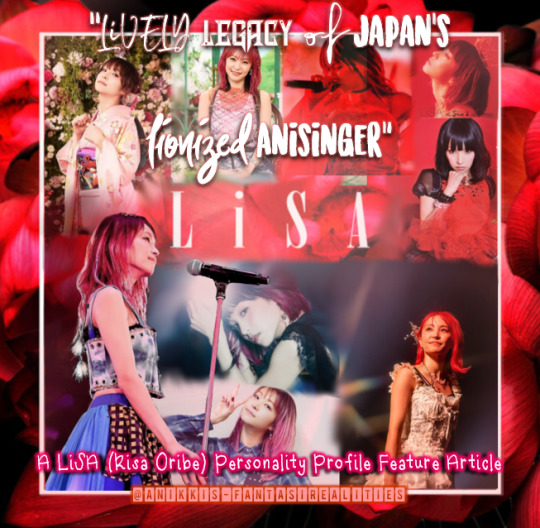
➀ Personality Profile ┊ ˢʰᵉ ʷʰᵒ ˢʰᶦⁿᵉˢ ᵗʰʳᵒᵘᵍʰ ˢᵒⁿᵍ ᵃⁿᵈ ˢᵗʸˡᵉ··· ˢᵐᶦˡᶦⁿᵍ ˢʷᵉᵉᵗˡʸ ʷʰᶦˡᵉ ˢᵃˡᵘᵗᵃᵗᶦⁿᵍ ˢᵘᵖᵖᵒʳᵗᵉʳˢ·
ㅤㅤㅤㅤㅤㅤㅤㅤㅤㅤㅤㅤㅤㅤㅤㅤㅤㅤㅤㅤㅤㅤㅤㅤㅤㅤㅤㅤㅤㅤㅤ꒰⁺˚₊·₍₍loading...₎₎ ㅤ ✎...۪۫❁ཻུ۪۪ -ˏˋ 🎤 ˊˎ-
ㅤㅤ ㅤㅤㅤ ㅤㅤㅤ ㅤㅤ ㅤㅤ ㅤㅤㅤ ㅤㅤㅤ ㅤㅤ ㅤㅤ ㅤㅤㅤ ㅤㅤㅤ
༘✶ ㊉ ��〘 ⅯⅯ 〙⋆。˚𓆟 ༉ ║ Posted : 06/15/21° 。༄ ‧₊˚ ๑ ㅤ ㅤ ㅤ ㅤ •ଓ.° 。❍ ㈩ ㊇
- - ——— ꒰ An article by Nicole “Nikki” Elaine S. Chua of NEU-IS ꒱

ㅤㅤ ㅤㅤ₊·͟͟͟͟͟͟͞͞͞͞͞͞➳❥ ࿐ྂ—͙❬₊° ᶦ ᵃᵐ ᵃ ᵇˡᵒᵍᵍᵉʳ ᵃᶠᵗᵉʳ ᵃˡˡ·“= ‹⸙͎
ㅤㅤㅤㅤㅤㅤㅤㅤㅤㅤㅤㅤㅤㅤㅤㅤㅤㅤㅤㅤㅤㅤㅤㅤㅤㅤㅤㅤㅤㅤ
youtube
ㅤㅤ ㅤ❝ Madamada iku wa yo~! ❞
ㅤㅤ ㅤㅤㅤㅤ ㅤㅤㅤㅤ ㅤㅤㅤㅤ ㅤ ㅤ- LiSA (Rally Go Round)
ㅤㅤ ㅤㅤㅤ ㅤㅤㅤ ㅤㅤㅤ ㅤ.ılı.lıllılı.ıllı. ㅤㅤ ㅤㅤㅤ ㅤㅤㅤ ㅤㅤᴺᵒʷ ᵖˡᵃʸᶦⁿᵍ﹕ᵍᵘʳᵉⁿᵍᵉ ⁻ ᴸᶦˢᴬ ㅤㅤ ㅤㅤㅤ ㅤㅤㅤ ㅤㅤ0:11 -◦————— 3:59 ㅤㅤ ㅤㅤㅤ ㅤㅤ〔 ↠ⁿᵉˣᵗ ˢᵒⁿᵍ ╵╻↺ ʳᵉᵖᵉᵃᵗ ╻╵⊜ ᵖᵃᵘˢᵉ 〕 ㅤㅤ ㅤㅤㅤ ㅤㅤㅤㅤVolume: ▁ ▂ ▃ ▄ ▅ ▆ █ 100%
Lush, loose—lofty and lovely. Lucent and lavish—lustral, laid-back, & luxuriant. Luminous. Legendary. Limitless. Light hearted and letter-perfect. There is not enough words for me to describe her overflowing talent for music, and the impact she has created for tech-savvy usernames cheering on their favorite idols & animations alike. Nowadays, most millennials and Gen Zs go neck-to-neck with their clashing interests of two international sensations: one known for the funky beats of charismatic boys dancing in synchrony, and the other, notable for moving illustrations of all kinds of stories that allure the imagination. Yes, let’s admit it, my generation has fallen in love with the influence of K-pop and anime, though I cannot blame anyone because of the fun & happiness they bring. Do you agree with me?
Well, even if you cannot agree or relate with me, I’m sure you would be able to find this article interesting! This personality is not someone of looming authority nor power—she is not a lady from the West, nor the Northern isles or even the Southern seas. She is here: the Rising Sun’s pride and honor bestowed by a sharp katana slaying all evil. It is where that familiar tune of hers is empowered with the narrative of a young man and his breathing techniques—a tale beloved by many anime fanatics. Yes! I’d like to introduce to you, one of Japan’s famed singers of all time: 𝙇𝙞𝙎𝘼! Make your entrance, please!
╭╼|════════════════════════════════════|╾╮
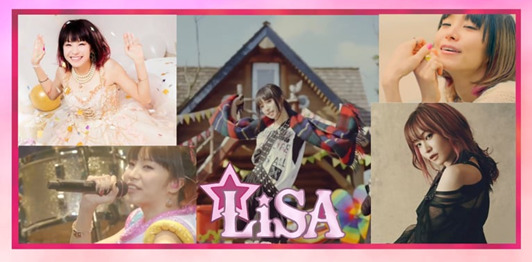
ㅤㅤ ㅤㅤㅤ ㅤㅤㅤ ㅤㅤ 【 今日もいい日だつ 】 ㅤㅤ ㅤㅤㅤ ㅤㅤㅤ ❝ Today is another great day! ❞ ㅤㅤ ㅤㅤㅤ ㅤㅤㅤ ㅤㅤㅤ ㅤㅤㅤ ㅤㅤㅤ ㅤ- LiSA ╰╼|════════════════════════════════════|╾╯
My life is truly music-inclined, even if I have two left feet and a raspy, rough voice. Those foreign lyrics ring out in my head, every time I enter through the gates of Japanese culture and enter my fantasy I know so well. I mean, cool right? I can still remember how I first embraced her beginning chords in January 2020, when that song, Gurenge, was heard throughout the spacious stadium of the New Era University college department. It was the opening ceremony for Intramurals 2020, and as soon as the melody played, the crowd sang along in a noisy type of harmony.
𝙂𝙪𝙧𝙚𝙣𝙜𝙚, it means “red lotus” in English—the title of the Japanese opening theme for the animation called, “Kimetsu no Yaiba,” or more acclaimed as “Demon Slayer” by millions of anime ethusiasts across the web. I wondered what that range of vocals wanted to tell me. Those beautiful notes and the intensifying instrumental that accompanies such an epic story. Slowly, I understood why she is adored by many people, rain or shine, sun rays to lunar silhouettes. Now, here I am writing with everlasting conviction, to share everything I know about her—the reasons why that captivating rhythm, those inspiring words, and the pleasant emotions, made me sing along. So, let’s rest for a while, and I’ll tell you more about LiSA, behind the reflection of that worn out blade.
ㅤㅤㅤㅤㅤㅤㅤㅤㅤㅤㅤㅤㅤㅤㅤㅤㅤㅤㅤㅤㅤㅤㅤㅤㅤㅤㅤㅤㅤㅤ
LiSA, or Risa Oribe in real life, is a Japanese singer, songwriter, and lyricist from the Gifu Prefecture—in the small city of Seki. She is 165 centimeters tall, which is quite tall for a Japanese woman. She is known for her multiple song hits used in Japanese animation titles such as the Fate series and Sword Art Online. Though, did you know that she also sang for the music-based anime series, “Angel Beats!” as one of the main characters who so happened to be a vocalist, as well? This was LiSA’s professional song debut in the music industry, which she lunged into when she was given a chance to step onto the reknowned arena for some of Japan’s history makers: Nippon Budokan! As a kid, Risa Oribe was taught lessons in piano, dancing, and singing, which continued onto her junior high school years. After auditioning in the infamous Budokan, she held onto the dream of becoming an artist on the next journeys she would walk on outside her hometown.
Believe it or not, the name “LiSA” is an stylized acronym, consisting of confident letters that possess unique dignified meaning from one another. The stage name is adopted from a blast from the past, of the times Risa Oribe had travelled to Tokyo to form a band. “LiSA” stands for, “𝙇𝙤𝙫𝙚 𝙞𝙨 𝙎𝙖𝙢𝙚 𝘼𝙡𝙡” which may sound weird for English speakers, nonetheless, its significance still pulls my heartstrings all in all. Prior to becoming the individual singing artist, “LiSA,” Risa Oribe has always been a part of bands ever since high school—one of them being a cover band of indie rock music, “CHUCKY.” Despite the risk of working with the band in exchange for her accredited certificates from university, she continued to reach for her ultimate dream career as a singer. Unfortunately, “CHUCKY” only lasted for three years, and this is what led Risa Oribe to test her luck in the capital of Japan—persevering for that aspiration, because there’s no turning back now!
╭╼|════════════════════════════════════|╾╮
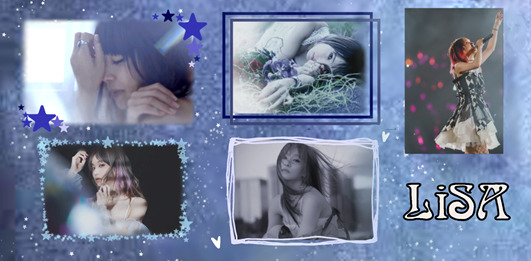
ㅤㅤ 【 じっと見つめた キミの瞳に映ったボクが生きたシルシ 】
ㅤㅤ ❝ As I stare intently into your eyes, ㅤㅤ ㅤㅤ ㅤㅤ ㅤㅤ ㅤmy reflection there is the proof I exist, ❞ ㅤㅤ ㅤㅤ ㅤ ㅤㅤ ㅤㅤ ㅤㅤ ㅤㅤ ㅤㅤ ㅤㅤ ㅤ- LiSA (Shirushi)
╰╼|════════════════════════════════════|╾╯
LiSA’s musical influences are, surprisingly, internationally respected musicians of the English language. Some of these prominent figures in her life are Avril Lavigne, Green Day, Paramore, and Rihanna. She is well-known for memorable hyped performances filled of power and passion. Sometimes, if people are granted the opportunity to be mesmerized by remarkable skill, she is also able to play the guitar and key harmonica in her concerts. She can sing in Japanese, obviously, but her words weaved with melody extends into Chinese and English perception, too. As a songwriter, she personally wrote some of her produced masterpieces like “Shirushi” and “Rally Go Round.” Though, perhaps you’ve never would guess that LiSA had a voice acting debut in 2015, too! Don’t get your hopes up because she did not give life to any anime characters, but instead, she became the Japanese voice of Madge Nelson in the film, “Minions.” I know, don’t get me wrong, it’s a shocking difference from the person LiSA is famous for.
However, for Risa Oribe, it was not something to be shy about, for she absolutely loves Minions! For avid fans of LiSA, they would often spot sightings of Minions merchandise in her social media accounts. It’s a fact that wouldn’t make you think that she can be that intimidating performer on fire, once she leaps onto stage. She still has that gentle vibe, especially when she raises her arm to greet the audience with a simple peace sign. The dark packed venue would chant along the bridge instrumental, rapidly waving their lightsticks until the song performance is finished. It’s as if the stars have landed in a small part of Earth during the night fall, to take a day-off head banging to the beat of rock. LiSA’s concerts deliver the message that “𝙇𝙞𝙫𝙚 𝙞𝙨 𝙎𝙢𝙞𝙡𝙚 𝘼𝙡𝙬𝙖𝙮𝙨,” as it is the running title pinned to her lives from then to now.
ㅤㅤㅤㅤㅤㅤㅤㅤㅤㅤㅤㅤㅤㅤㅤㅤㅤㅤㅤㅤㅤㅤㅤㅤㅤㅤㅤㅤㅤㅤ
Speaking of which, here’s a fun fact! Did you also know that LiSA’s albums all start with the letter L? From “Letters to U” and “Launcher,” to “Leo-Nine” and the recently revealed “Ladybug,” each album has a motif that follows her musical style. LiSA’s original songs tell stories of hope, determination, and love. Ever since she released her first solo single debut, “Oath Sign,” for the anime, “Fate/Zero,” her name would never vanish from the music charts of new singles and albums in Japan. Songs like “Crossing Field,” “Catch the Moment,” and “ADAMAS,” of “Sword Art Online” were also noteworthy for their impact on LiSA’s career as a singer, not only for Japanese animations, but also for Japanese TV dramas and live-action films. Her very own, “Homura,” for the anime film, “Demon Slayer: Kimetsu no Yaiba: Mugen Train” have even outstretched to the Billboard charts across the Pacific ocean!
Today, she has celebrated her 10th anniversary in the music industry—a realization that it just seems like yesterday when she got to meet her fans in different countries, go on tours to perform everyone’s favorite anime songs of hers, and made her mark as an “𝙖𝙣𝙞𝙨𝙞𝙣𝙜𝙚𝙧” of the Rising Sun. That is why she is, indeed, an artist with a lively legacy to our current era—a personality deserving of a profile article from yours truly. It’s been great having you with me in this article, and I hope you were able to find admiration for LiSA and her work! Thank you for reading! I’ll see you again in another blog where my fantasies become realities! A Nikki reminder: don’t always go with the flow, and be yourself! Good day!
╭╼|════════════════════════════════════|╾╮
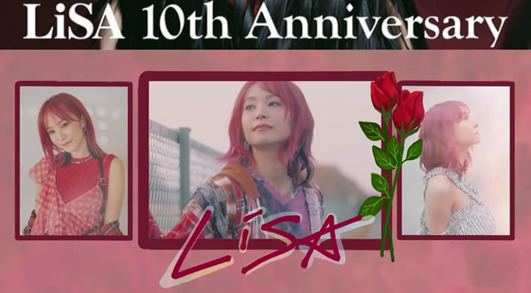
ㅤㅤ ㅤㅤ 【 生き残ったこの世界で 新しい 眩しい ㅤㅤ ㅤㅤ ㅤㅤ ㅤ ㅤㅤ ㅤㅤ ㅤㅤㅤ 開けを迎えに行こうか 】
ㅤㅤ ㅤ ㅤ❝ In this world I live in, there will be a new glow, ㅤㅤ ㅤㅤ ㅤㅤ for now let’s welcome the new dawn! ❞ ㅤㅤ ㅤㅤ ㅤㅤ ㅤㅤ ㅤㅤ ㅤㅤ ㅤㅤ ㅤㅤ ㅤㅤ - LiSA (dawn)
╰╼|════════════════════════════════════|╾╯
· * ✫ * ⊹ * ˚ . . · ⋆ * . * . . · . · . * · . · · + . ㅤㅤ ㅤㅤ ㅤㅤ ㅤ ㅤㅤ ㅤ ㅤㅤ ㅤㅤ ㅤㅤ ㅤ ㅤㅤ ㅤ ㅤㅤ ㅤㅤ ㅤㅤ ㅤ ㅤㅤㅤㅤ· ** ˚ . . + · ⋆ * . * . . · . · . *
ㅤㅤ ㅤㅤ. . + · ⋆ * . * . . · . · .˚ ⊹ · * ✧ ⋆ · * . · . · · .. . .
ㅤㅤ ㅤㅤ ㅤㅤ ㅤ ㅤㅤ ㅤ ㅤㅤ ㅤㅤ ㅤㅤ ㅤ ㅤㅤ ㅤ ㅤㅤ ㅤㅤ ㅤㅤ ㅤ ㅤㅤㅤ ㅤ ㅤㅤ ㅤㅤㅤ· + ㅤㅤ ㅤ ㅤㅤ ㅤㅤ· * ✫ * ⊹ * ˚
ㅤㅤ ㅤ ㅤㅤ · ** ˚ . . + ㅤㅤ · ⋆ * . * . . · . · .˚ ⊹ · * ✧
ㅤㅤ ㅤㅤ ㅤㅤ ㅤ ㅤㅤ ㅤ ㅤㅤ ㅤㅤ ㅤㅤ ㅤ ㅤㅤ ㅤ ㅤㅤ ㅤㅤ ㅤㅤ ㅤ ㅤㅤ ㅤ ㅤㅤ ㅤㅤ⋆ · * . · ㅤㅤ . · · .. . . · + .
ㅤㅤ ㅤ ㅤㅤ ㅤㅤ ㅤㅤ ㅤ ㅤ. · + . *
ㅤㅤ ㅤㅤ ㅤㅤ ㅤ ㅤㅤ ㅤ ㅤㅤ ㅤㅤ ㅤㅤ ㅤ ㅤㅤ ㅤ ㅤㅤ ㅤㅤ ㅤㅤ ㅤ ㅤㅤ ㅤ ㅤㅤ ㅤㅤㅤㅤ ⋆ * . * . .
ㅤㅤ ㅤ ㅤㅤ ㅤㅤㅤㅤ ㅤ . · ·
ㅤㅤ﹙dedication. ﹚ ୨˚୧ ˚ ༘♡.↳ ₊˚‧
This blog is dedicated to my sister, who is a big fan of LiSA. I am grateful that you’ve made me sing with her, forevermore.
ㅤㅤ ㅤㅤ ㅤㅤ ㅤ ㅤㅤ ㅤ ㅤㅤ ㅤㅤ ㅤㅤ ㅤ ㅤㅤ ㅤ ㅤㅤ ㅤㅤ ㅤㅤ ㅤ ㅤㅤ ㅤㅤ ㅤㅤ ㅤ ㅤㅤ ㅤ ㅤㅤ ㅤㅤ ㅤㅤ ㅤ ㅤㅤ ㅤ ㅤㅤ ㅤㅤ ㅤㅤ ㅤ ㅤㅤ ㅤㅤ ㅤㅤ ㅤ ㅤㅤ ㅤ ㅤㅤ ㅤㅤ ㅤㅤ ㅤ ㅤㅤ ㅤ ㅤㅤ ㅤㅤ ㅤㅤ ㅤ ㅤㅤ ㅤㅤ ㅤㅤ ㅤ ㅤㅤ ㅤ ㅤㅤ ㅤㅤ ㅤㅤ ㅤ ㅤㅤ ㅤ ㅤㅤ ㅤㅤ ㅤㅤ ㅤ ㅤㅤ ㅤ ㅤㅤ ㅤㅤ ㅤㅤ ㅤ ㅤㅤ ㅤㅤ ㅤㅤ ㅤ ㅤㅤ ㅤ ㅤㅤ ㅤㅤ ㅤㅤ ㅤ
ㅤㅤㅤㅤㅤㅤㅤㅤ﹋﹋﹌﹌﹌「 🎀 」﹌﹌﹌﹋﹋
ㅤㅤ ㅤㅤ ㅤㅤㅤ ㅤㅤㅤ ┊彡 Credits
➥ Cover Edit
➫ Background
➫ Stand-out LiSA holding a microphone stand
➫ Sitting LiSA
➫ Butterfly themed LiSA
➫ Kimono LiSA
➫ "Brave Freak Out" promotional picture
➫ "Only ≠ Lonely"
ㅤㅤ ㅤㅤ ㅤㅤ ㅤ ㅤㅤ ㅤ ㅤㅤ ㅤㅤ ㅤㅤ ㅤ ㅤㅤ ㅤ ㅤㅤ ㅤㅤ ㅤㅤ ㅤ ㅤㅤ ㅤㅤ ㅤㅤ ㅤ ㅤㅤ ㅤ ㅤㅤ ㅤㅤ ㅤㅤ ㅤ ㅤㅤ ㅤ ㅤㅤ ㅤㅤ ㅤㅤ ㅤ
➥ GIF
➫ "Gurenge" Music Clip ㅤㅤ ㅤㅤ ㅤㅤ ㅤ ㅤㅤ ㅤ ㅤㅤ ㅤㅤ ㅤㅤ ㅤ ㅤㅤ ㅤ ㅤㅤ ㅤㅤ ㅤㅤ ㅤ ㅤㅤ ㅤㅤ ㅤㅤ ㅤ ㅤㅤ ㅤ ㅤㅤ ㅤㅤ ㅤㅤ ㅤ ㅤㅤ ㅤ ㅤㅤ ㅤㅤ ㅤㅤ ㅤ
➥ First Blog Divider
➫ "Datte Atashino Hero" Music Video
➫ "KiSS me PARADOX" -LiVE is Smile Always ~PiNK & BLACK~ Live
➫ "No More Time Machine" Music Clip
➫ "LEO-NiNE" Limited Edition A Album Cover
➫ "LUCKY Hi FiVE" Single Cover ㅤㅤ ㅤㅤ ㅤㅤ ㅤ ㅤㅤ ㅤ ㅤㅤ ㅤㅤ ㅤㅤ ㅤ ㅤㅤ ㅤ ㅤㅤ ㅤㅤ ㅤㅤ ㅤ ㅤㅤ ㅤㅤ ㅤㅤ ㅤ ㅤㅤ ㅤ ㅤㅤ ㅤㅤ ㅤㅤ ㅤ ㅤㅤ ㅤ ㅤㅤ ㅤㅤ ㅤㅤ ㅤ
➥ Second Blog Divider
➫ Raising Arm LiSA
➫ "ASH" Single promotional picture
➫ "Unlasting" promotional picture
➫ "ADAMAS" article by Billboard
➫ "Shirushi" Music Video ㅤㅤ ㅤㅤ ㅤㅤ ㅤ ㅤㅤ ㅤ ㅤㅤ ㅤㅤ ㅤㅤ ㅤ ㅤㅤ ㅤ ㅤㅤ ㅤㅤ ㅤㅤ ㅤ ㅤㅤ ㅤㅤ ㅤㅤ ㅤ ㅤㅤ ㅤ ㅤㅤ ㅤㅤ ㅤㅤ ㅤ ㅤㅤ ㅤ ㅤㅤ ㅤㅤ ㅤㅤ ㅤ ㅤㅤ ㅤㅤ ㅤㅤ ㅤ ㅤㅤ ㅤ ㅤㅤ ㅤㅤ ㅤㅤ ㅤ ㅤㅤ ㅤ ㅤㅤ ㅤㅤ ㅤㅤ ㅤ
➥ Third Divider
➫ Red-themed LiSA
➫ "Letters to ME" Music Video
➫ "Surprise" Music Video ㅤㅤ ㅤㅤ ㅤㅤ ㅤ ㅤㅤ ㅤ ㅤㅤ ㅤㅤ ㅤㅤ ㅤ ㅤㅤ ㅤ ㅤㅤ ㅤㅤ ㅤㅤ ㅤ ㅤㅤ ㅤㅤ ㅤㅤ ㅤ ㅤㅤ ㅤ ㅤㅤ ㅤㅤ ㅤㅤ ㅤ ㅤㅤ ㅤ ㅤㅤ ㅤㅤ ㅤㅤ ㅤ ㅤㅤ ㅤㅤ ㅤㅤ ㅤ ㅤㅤ ㅤ ㅤㅤ ㅤㅤ ㅤㅤ ㅤ ㅤㅤ ㅤ ㅤㅤ ㅤㅤ ㅤㅤ ㅤ
➥ Source of Information
➫ LiSA Wikipedia page
➫ LiSA’s Discography Wikipedia page
➫ Every Anime Song by LiSA fan-video compilation
ㅤㅤ ㅤㅤ ㅤㅤ ㅤ ㅤㅤ ㅤ ㅤㅤ ㅤㅤ ㅤㅤ ㅤ ㅤㅤ ㅤ ㅤㅤ ㅤㅤ ㅤㅤ ㅤ ㅤㅤ ㅤㅤ ㅤㅤ ㅤ ㅤㅤ ㅤ ㅤㅤ ㅤㅤ ㅤㅤ ㅤ ㅤㅤ ㅤ ㅤㅤ ㅤㅤ ㅤㅤ ㅤ ㅤㅤ ㅤㅤ ㅤㅤ ㅤ ㅤㅤ ㅤ ㅤㅤ ㅤㅤ ㅤㅤ ㅤ ㅤㅤ ㅤ ㅤㅤ ㅤㅤ ㅤㅤ ㅤ ㅤㅤ ㅤㅤ ㅤㅤ ㅤ ㅤㅤ ㅤ ㅤㅤ ㅤㅤ ㅤㅤ ㅤ ㅤㅤ ㅤ ㅤㅤ ㅤㅤ ㅤㅤ ㅤ ㅤ ㅤㅤ﹋﹋﹌﹌﹌「 end. 」﹌﹌﹌﹋﹋
ㅤㅤ ㅤㅤ ㅤㅤ ㅤ ㅤ ⭆ Back to Homepage ⭅
ㅤㅤ ㅤㅤ ㅤㅤ ㅤ ㅤ ㅤㅤ ㅤㅤㅤ ㅤㅤ ㅤㅤ ㅤ ㅤ ㅤㅤ ㅤㅤ Next Blog ⇨
#NEU-IS PH#Creative Non-fiction#Feature Article#Blogging#Personality Profile#aNikKis Fantasirealities#LiSA#Anisinger#Youtube
2 notes
·
View notes